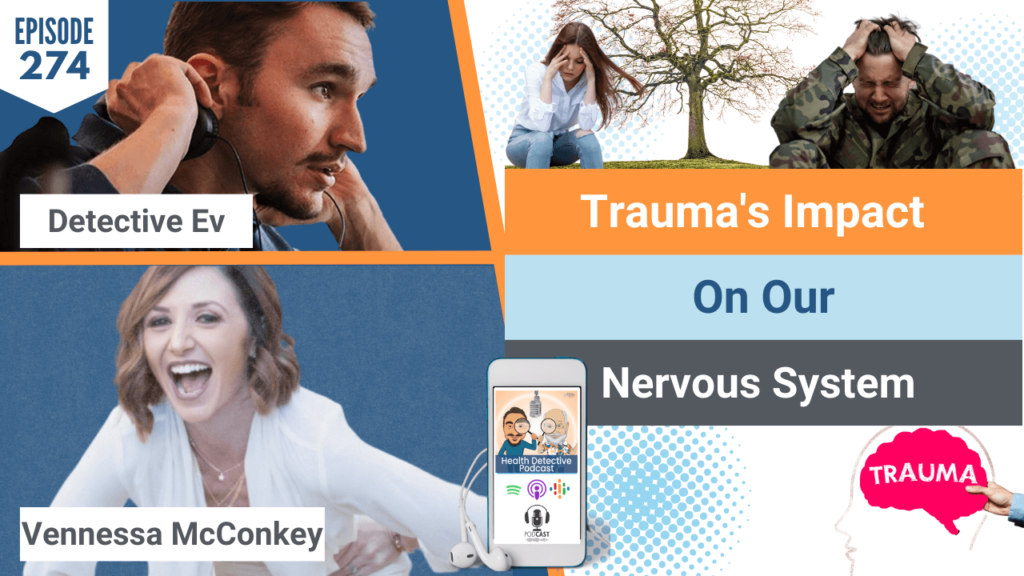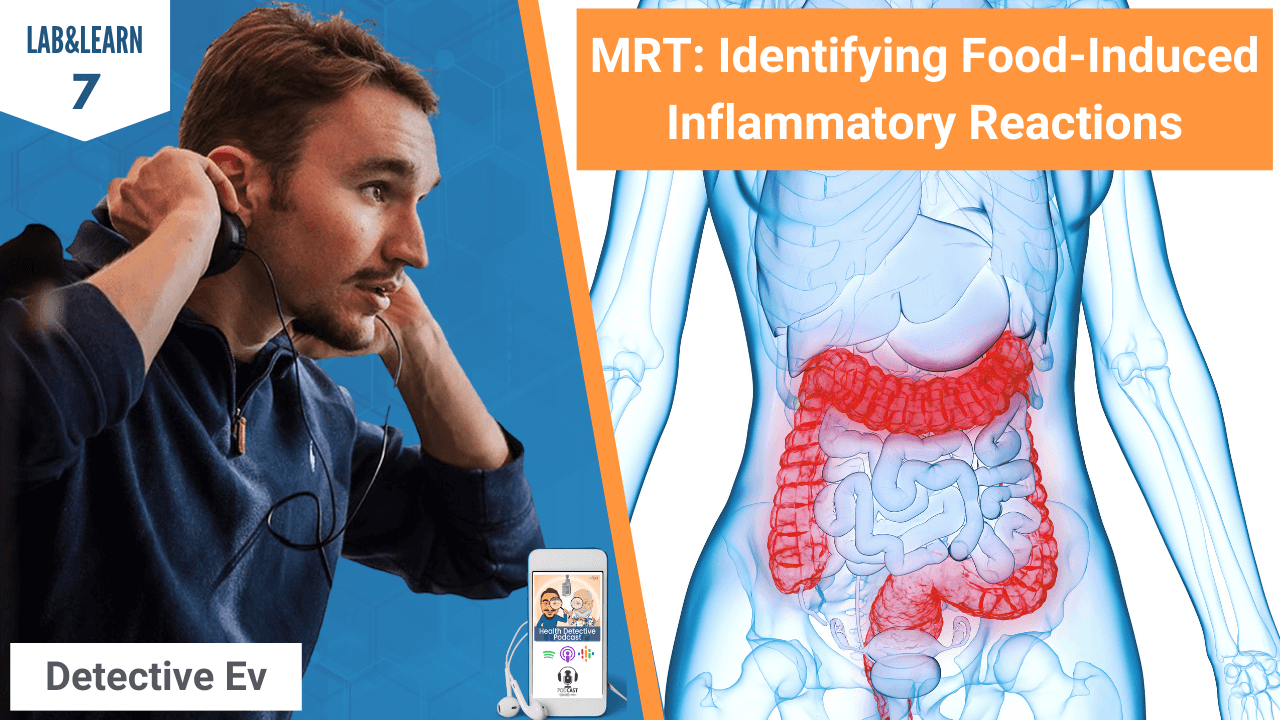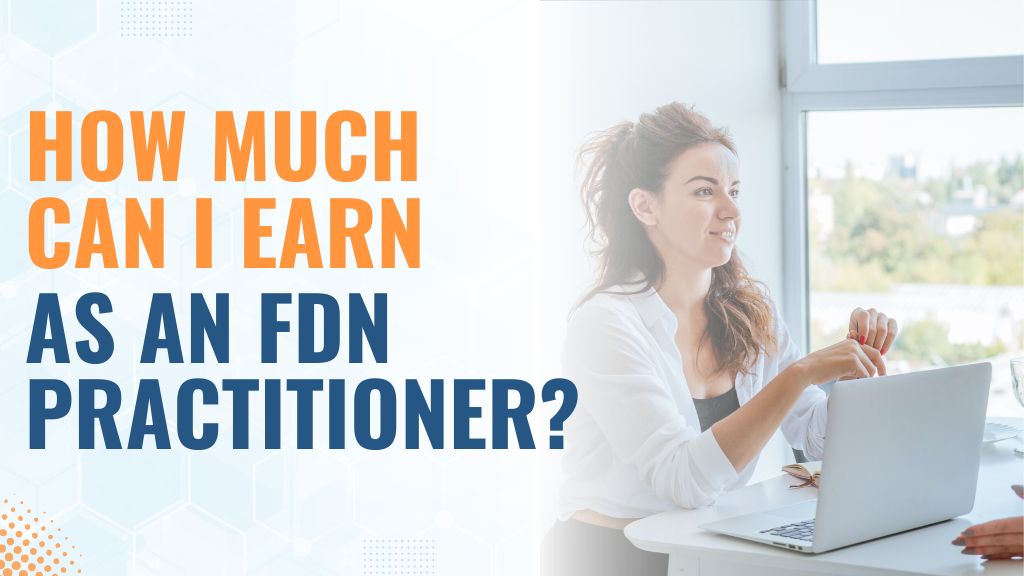Introduction
[00:00:00] Detective Ev: Hello my friends and welcome back to another episode of the Health Detective Podcast by Functional Diagnostic Nutrition. My name is Evan Transue, AKA Detective Ev. I will be your host for today’s show on trauma’s impact on our clients.
We have with us Vennessa McConkey. She is coming back for a second appearance after absolutely crushing her first episode. It was amazing. I don’t know if you guys got to hear that. If not, click here. Please check it out. Very powerful story.

But after people come on and share their story on this podcast, sometimes we like to have them back on again and talk about a specific topic. Today’s topic is trauma and how it relates to the central nervous system. And if you had listened to the first episode with Vennessa and I, you know that we will also touch on a variety of other things outside of the main topic for today.
Here’s her bio, then we’ll jump right into the episode. It’s a long one.
Trauma’s Impact: Educating & Empowering Others
Vennessa is a passionate, energetic, tenacious woman, wife, and mom of three young boys. She has always believed in helping people, whether it be in the community, schools, or corporate world. Her career started early since both her parents and grandparents were business owners.
Hard work was highly valued in her family, and she attended a science and engineering academy through most of high school and also attended Southern Illinois University for Industrial Engineering Technology, graduating in only three years. She worked her way up the corporate ladder very quickly and found herself running organizations at a young age.
During the course of all this corporate success, she was diagnosed with a rare disease which left her relying on many different medical professionals. She finally ended her corporate career, and her husband and her became pregnant with their first son. Life seemed good, and she started a resume writing and executive career coaching business where the skills she learned in corporate once again created success.
But two things happened. One, her health took a nosedive. Two, she noticed 85 percent of her clients struggled with health issues that were affecting how they performed at work. She couldn’t help people any longer find jobs if she knew their health was affecting more than just them. In taking a sabbatical, she uncovered hefty relational issues with her husband and her parents, leading to her discovery of functional nutrition in FDN, and this ultimately uncovered how trauma creates disease for her.
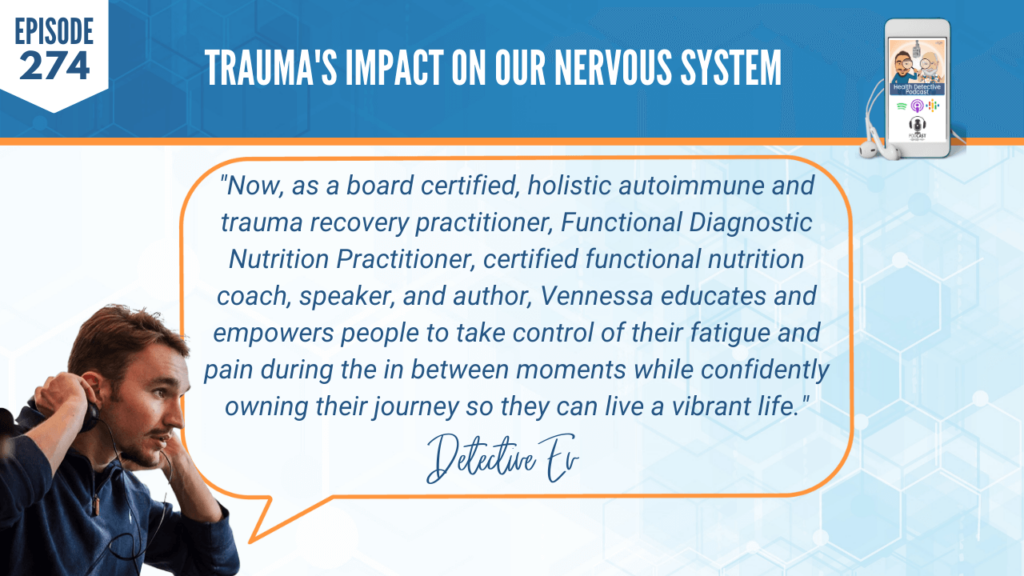
Now, as a board certified, holistic autoimmune and trauma recovery practitioner, Functional Diagnostic Nutrition Practitioner, certified functional nutrition coach, speaker, and author, Vennessa educates and empowers people to take control of their fatigue and pain during the in between moments while confidently owning their journey so they can live a vibrant life.
Trauma’s Impact: Interaction with the Nervous System
Once again, Vennessa crushed it. You’re going to love this episode; you could listen to her all day. She has one of those gifts. Without further ado, let’s learn how the central nervous system gets affected by trauma.
Hello there, Vennessa. Welcome back to the Health Detective Podcast. How are you?
[00:02:50] Vennessa McConkey: Thank you for having me again.
[00:02:51] Detective Ev: You guys need to go listen to the first episode that we did with Vennessa. It is a perfect segue. We’ve interviewed 200 something people. It was one of my favorite episodes. I love the story; I love that you got to share it.
Usually as a host, you have to be careful because you don’t want to let someone go for too long, but you also don’t want someone to give too short of answers. Every now and then there’s someone that I can come in and ask a couple of questions and you have the story so well-articulated and down that it’s, okay, I have the best job in the world today.

It was amazing. A lot of vulnerable stuff. I would definitely recommend going and listening to that. It’s the human side of what we’ll talk about today. But with that all said, what we are going to be discussing is stuff with trauma and the nervous system and how these things can interact. It’s actually a topic I’ve become more interested in.
I think this is an unfortunate stereotype that many of us go through, especially as a young male, we get into this for the labs. I want to know the data, the biochemistry, which supplements, and what diet stuff to do. Some of us nail all of that and there’s still that lingering percentage that’s going on.
Trauma’s Impact: Trauma Vs. Stress
Eventually, you’re like, I’m living better than 99 percent of people. Why do I still have this stuff that’s not moving? And that’s when I had to start looking at some of the traumatic things that happen in life. We’ll touch on that more specifically.
Story aside, why is this the one thing that you ended up becoming so passionate about? Because there were multiple things to your story. Why is this your highlight thing that you’re super passionate about?
[00:04:17] Vennessa McConkey: What you said, I was doing all the things, right? Actually, I’m going to step back here.
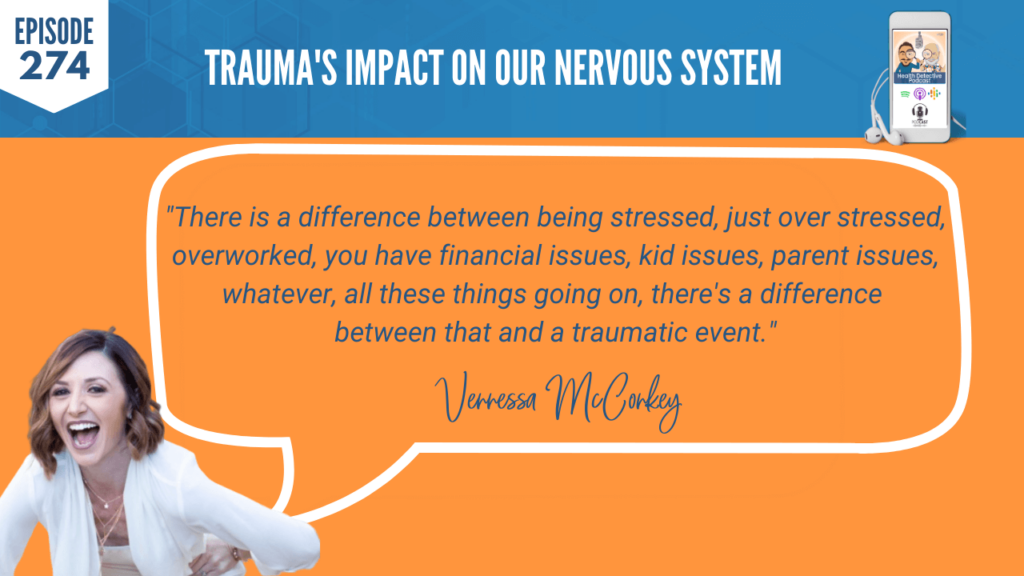
So, trauma, everyone’s, oh, I didn’t have a traumatic event in my life. There is a difference between being stressed, just over stressed, overworked, you have financial issues, kid issues, parent issues, whatever, all these things going on, there’s a difference between that and a traumatic event. You had a car crash, a death, a lot of people relate PTSD to war veterans, things like that. They had a set of events.
When you have trauma, especially complex trauma, I talk a lot about childhood trauma because it’s something I experienced. We always tend to, as practitioners, we’re going to attract people based on our personal story and whatnot. But childhood trauma is pretty serious.
It can be physical; it can be sexual. Those are still traumatic events and experiences. Because typically in childhood, if you’re sexually abused, it’s not a one-time thing and it can become complex. Then you start to have feelings and all that stuff. But then you have emotional and verbal abuse and neglect.
Trauma’s Impact: Hurting Others
So, going back in my story, if you guys went and listened to the first episode, which again, I highly recommend. Not just because it’s my story, but it does help piece some of this together. Because we’re health detectives, that’s what we do. We’re putting pieces of puzzles together for people.
I had to do that with myself. So, I did all the things. I was like, okay, I’m eating all the right foods. I have done the food sensitivities. I’ve done the allergy testing. I’m doing the exercises, the workouts, the stress relief that we all think we’re doing, resting well, whatever, all these things. And I’m a hard worker and all this stuff. But the needle still wasn’t moving. Something wasn’t right, and I knew something wasn’t right.
If you listen back to my other episode, I came back to the Chicago land area, Illinois, basically, where both my family and my husband’s family were because I’d found drugs and alcohol up the wazoo in our home in Phoenix. I addressed him as I said in our last episode. I said, hey! He was like, it’s legal. No, just because it’s legal doesn’t mean…
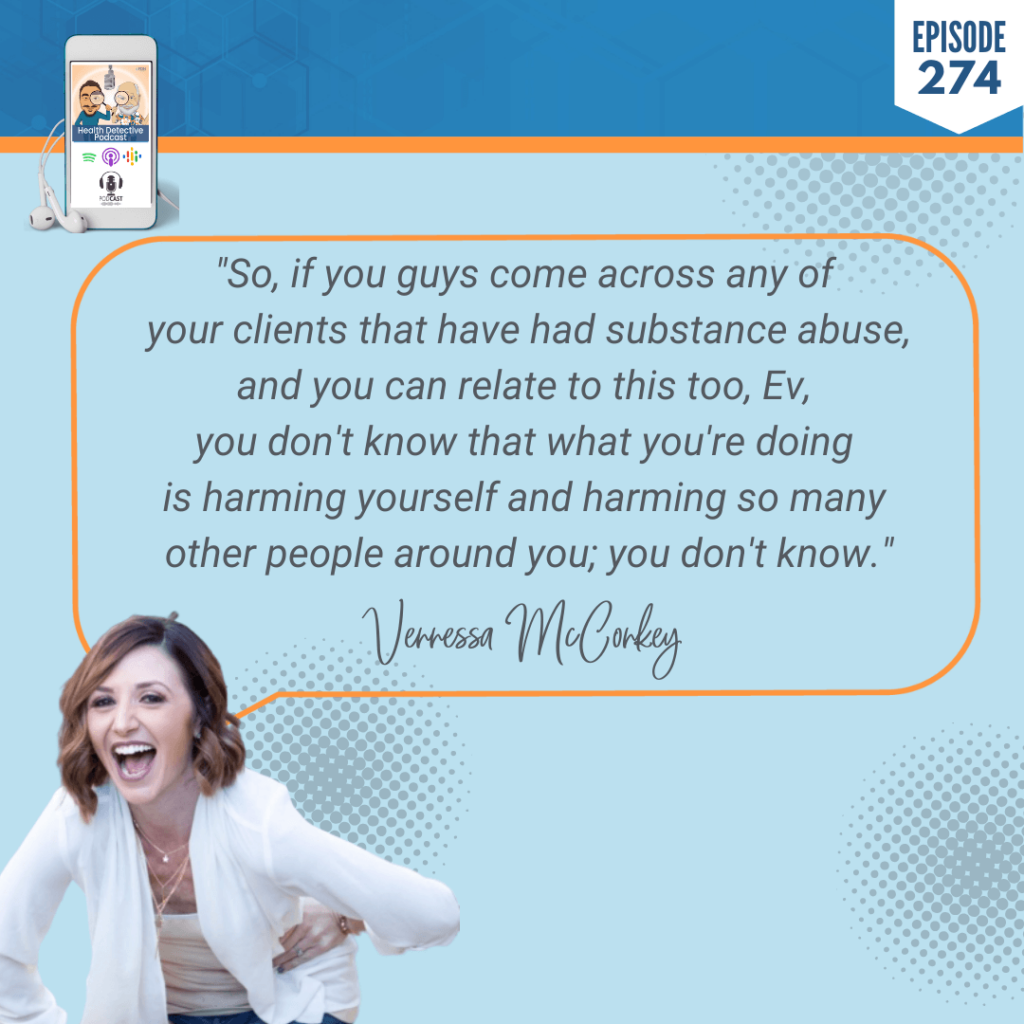
And here’s the thing that I’ve been understanding. So, if you guys come across any of your clients that have had substance abuse, and you can relate to this too, Ev, you don’t know that what you’re doing is harming yourself and harming so many other people around you; you don’t know. And that’s hard for me because I haven’t used, so I’m like, I don’t know.
Trauma’s Impact: Insensitivity to Others
But if you’re going to be working with someone like that, you have to understand it because they just don’t know they’re hurting. And if you can’t, please find someone else who has dealt with that so they can help that person in the right manner, because otherwise you will be hurting them more than anything.
And so, he’s like, it’s legal, whatever, it’s helping me calm down.
Now, going back to the whole trauma piece, there are two ways you can go when you’ve experienced complex trauma, we’re going to be talking about mostly. You can go into using substances, whatever your substance of choice. That can even be food, y’all. Okay. It can be exercise, whatever.
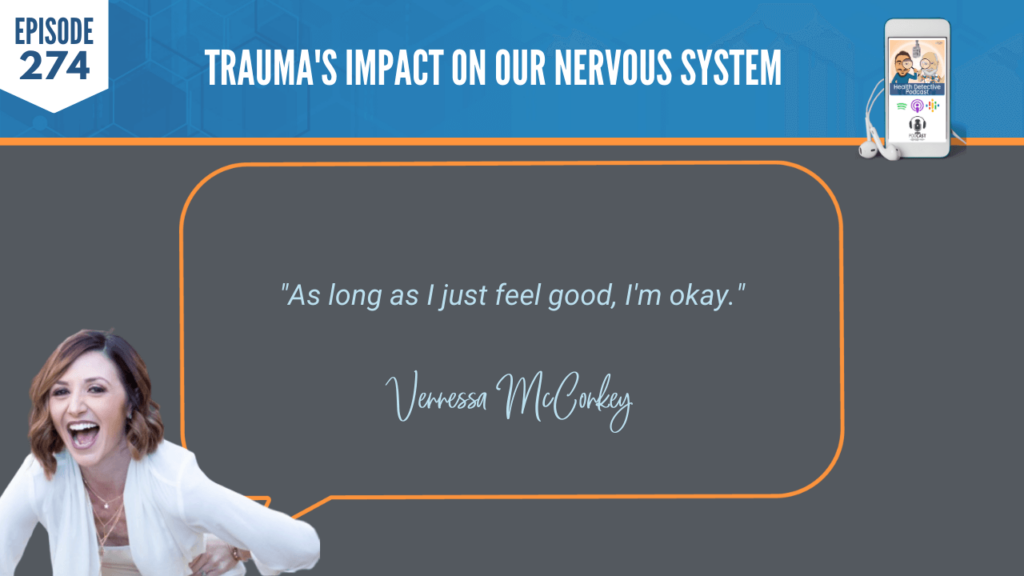
And then you’ve got the other side of it where you’re looking for worth. And people who have typically done that, like the substance abuse aspect of it, they want themselves to be in that parasympathetic realm. They want to just, it doesn’t matter, I’m just going to be doing the bare minimum. As long as I just feel good, I’m okay.
Correct me if I’m wrong, if that’s how you even felt too.
[00:07:49] Detective Ev: I didn’t want to cut you off before. But I’ll add really quickly. Not only do I think, one, it’s a very mature perspective for someone who hasn’t directly done those things with substances. You still have this very profound and mature perspective of you get that they’re not thinking about other people at the time. That is, honest to God, truth.
Trauma’s Impact: Parasympathetic Addiction
My whole aha moment, it’s the title of the presentation I do in schools. I built a career off it. The entire aha moment for me was this very sudden running into a brick wall realization that I am affecting the people around me. And thankfully that’s what triggered me into realizing, holy crap, I need to do something because I care about these other people. Then you start coming to this realization that it’s happening to yourself.
But to your other point about the parasympathetic, and I’m always transparent about this stuff. I think that’s important as a host just to share what you know about yourself at any given time. I must have done this at 16, 17, I have wired my brain in such a way that even if I don’t do it, that’s fine, but I crave marijuana under times of high stress and I know I’m pushing too fast.
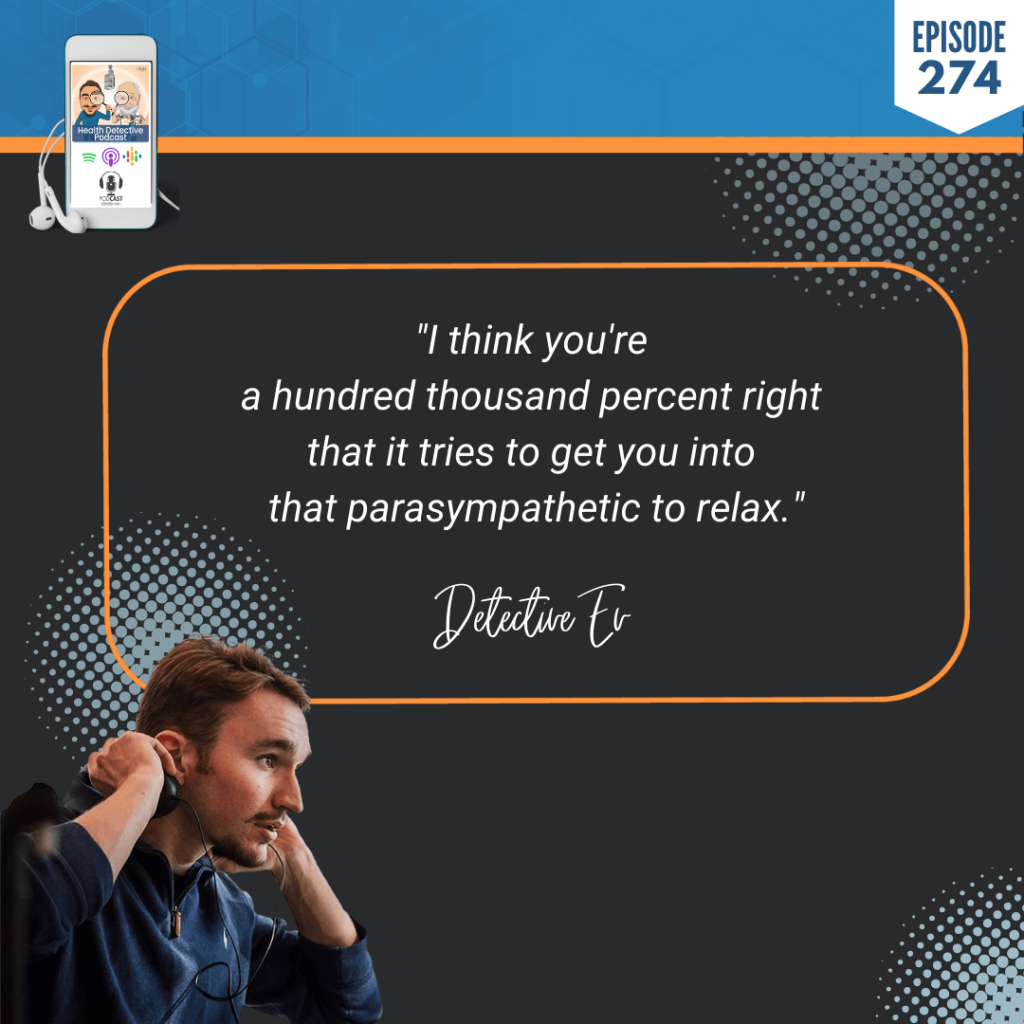
So, if I’m doing the 14, 15 hour a day thing, trying to buff something out, instantly, I crave something that otherwise I wouldn’t normally crave. And it’s, holy crap, like I wired my brain that this is the thing that gets me to sleep. This calms me down. So, I can see a direct correlation between the stress trigger and that. Now I know a little better and can balance things more appropriately. But I think you’re a hundred thousand percent right that it tries to get you into that parasympathetic to relax.
[00:09:16] Vennessa McConkey: Yeah, you have to recognize it as a practitioner too. And so, it’s going to be harder to get them motivated to do any of our protocols as well because they’re going to want to use something, right?
Trauma’s Impact: Overachieving Perfectionist
They’re going to want to take a supplement, right? Like you said, you’re going to want to take something to make you feel better. Then you have the opposite side. My husband has uncovered complex PTSD from his childhood. So, he used substances to make himself feel better. He was like, my parents use, so what’s the point? They’re not going to pay attention to me anyways.
We all have an innate desire to be wanted. And as children, it is that connection, that attachment that’s so important for a child. There’s been so many studies. I talk about it quite a bit on this stuff. And I even talked about it with my therapist because I was abused in the fact of being emotionally abused and neglected.
My mom would literally leave because she would say, I’m too much. I asked a lot of questions; I was curious about so many things. She would take my sister who was 18 months younger than me to the grocery store down the street. She’d write me a note and be like, hey, you know what? I’ll be back at this time and, whatever, right? So, I had a lot of that. You’re too much. Go to your room.
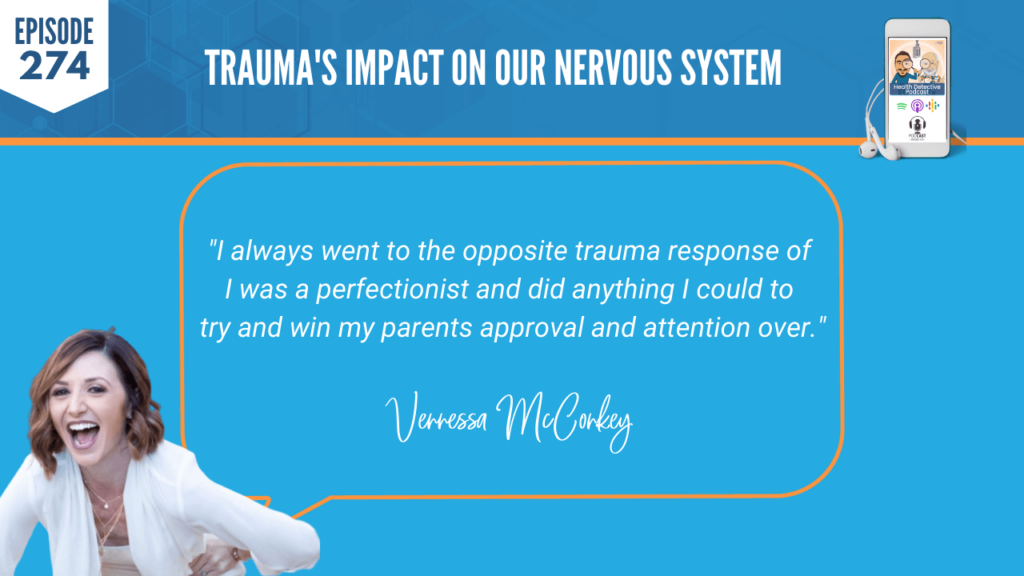
I think a lot of people, parents of our generation, go to your room and don’t come out until you’re happy or decent. And that has an effect on people. So, I always went to the opposite trauma response of I was a perfectionist and did anything I could to try and win my parents approval and attention over.
Trauma’s Impact: Sympathetic Overdrive Addiction
I did everything. So, I was the star student, graduated college, engineering school in three years. Then, I did 21 hours a semester working two jobs. And I was at Southern Illinois driving up to Chicago every other weekend to work at a restaurant because I made a heck of a lot more money up there than I did the restaurant job down there.
I had a job by my first year of college that put me in a paid internship. And I got to name my dollar as soon as I got out. So, I never applied to a job that had an actual application. They had a job description up and available. I actually just walked into places because I’m like, I’m that confident. Someone is going to see me. That kept me in the sympathetic mode all the time of, I gotta go, I gotta go. I always gotta be doing.
If I wasn’t doing something in my home, like actually doing – a human doing, not a human being – it was, why are you sitting there? I’m like, are you kidding me? Can’t I just rest for one minute? Saturdays, us girls had to be up doing yard work or helping dad with his business, or whatever. You’re like, when do I get a break? I went like that, like crazy.

If you listen back to my other episode of Annihilating Addison’s Disease, my dad apparently had Addison’s disease, so it was genetic. No, it was just the overdrive of that HPA axis that we have of just constant cortisol. Constant, constant. I couldn’t settle down. So, coming back to our home here, my childhood home in Illinois after finding the substances bringing all our kids here, I’m in overdrive. I can’t think straight.
Trauma’s Impact: Suppressing Emotions
But here’s the thing, this is something you have to look forward to. If you’re working with a client who is in that overdrive, they’re going to be hypervigilant, and they work so incredibly well under emergency situations. You want them around, because we are calm, we are collected. But we’re constantly, like I can see all the way back here with my hands because I had to, growing up. I had to know what was going on all the time. So, I had to have some kind of control because I never knew what was going to happen in my home.
If dad was going to come home and he was going to be in a good mood, bad mood. If I was in a good mood, he was in bad mood, do I share my good mood? Or do I just hold it in? That’s another thing too. When you’re dealing with clients who have been in complex trauma situations, specifically all the way from childhood.
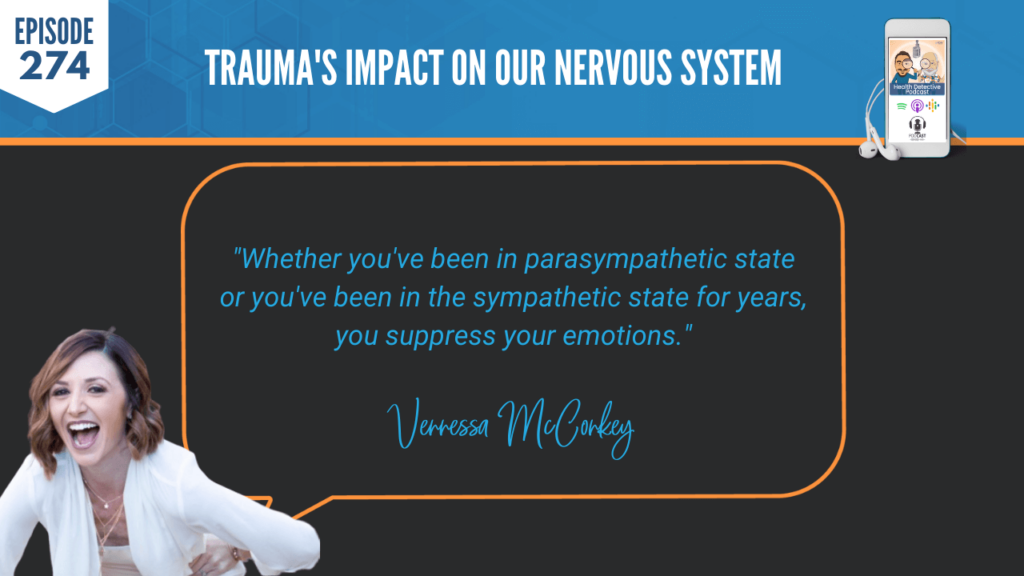
Now, you can start it in adulthood as well. You could have a teenage situation, even a college situation, whatever that is, but especially decades of childhood trauma, and you suppress your emotions. You know this too, right? Whether you’ve been in parasympathetic state or you’ve been in the sympathetic state for years, you suppress your emotions.
You’re not allowed to be angry; you’re not allowed to be sad. You have to be happy, upbeat all the time in order for people around you to accept you. And that puts such a stressor on our nervous system, especially if since birth.
Trauma’s Impact: Out-of-the-Womb Stressors
Like for me, example, since birth, I came out of the womb, I had stressors. My C3 and C4 in my neck are fused together. They could have been fixed right away at childbirth. My parents were like, no, she’ll be fine. Yeah, my parents were under the same generation too of, let the baby cry it out. It’s okay. You don’t need to hold the baby too much. That actually makes things worse for a child.
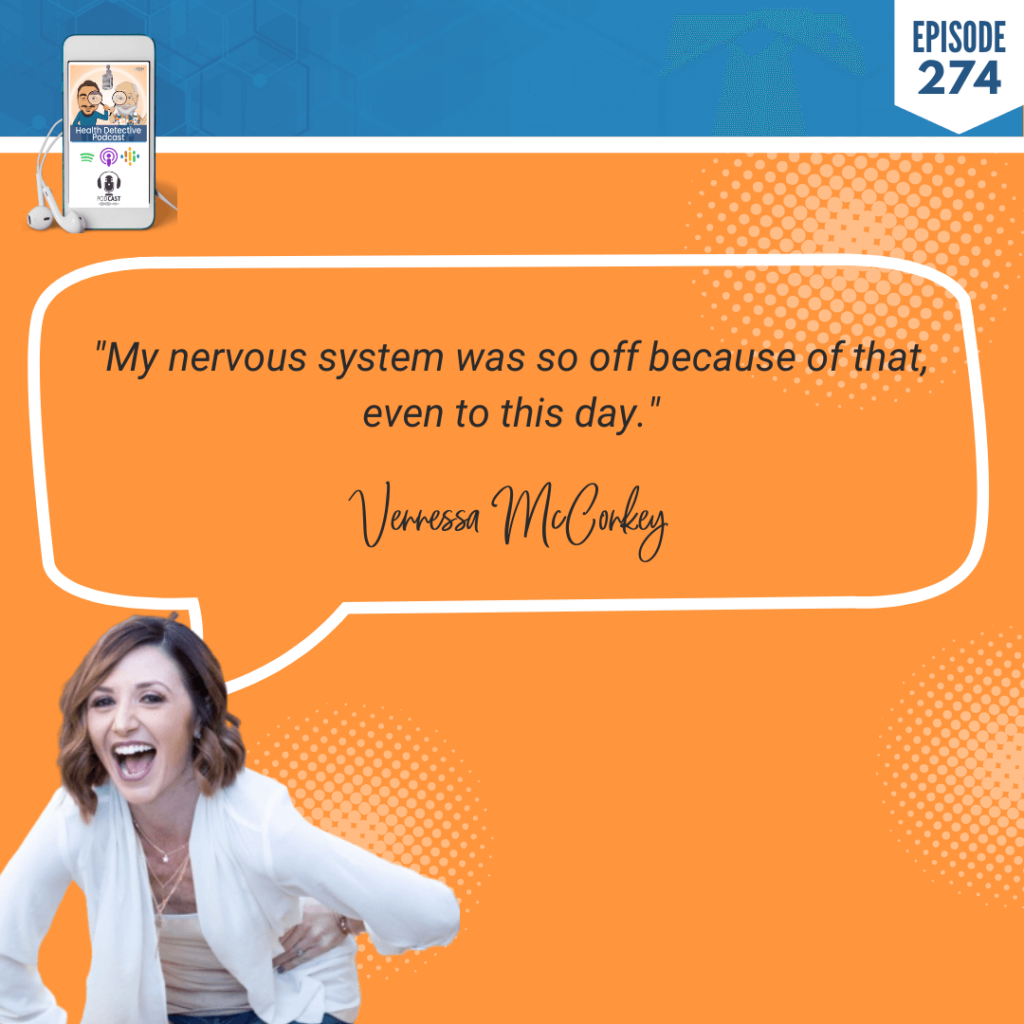
You cannot overhold a child. I sat there and battled with that wit my children. I’m like, my mom says, don’t hold the baby. Let him cry it out. But I would sit outside their door and be like, no, I can’t. I had to go in. And I’m like, I can’t because I lacked that as a child. My nervous system was so off because of that, even to this day.
I have situations that we were just talking beforehand. We had a massive plumbing issue. I was like, oh my God. What are we going to do? Do we have a plan? We’ve got all these different things. And then I finally realized, it’s not an emergency. The house isn’t blowing up. No one’s at risk other than mold, possibly. So, what are we so freaked out about?
But when I came back to Illinois and I got in that same childhood environment that I grew up in, I thought my parents were saving me. I thought for once, this is that one thing my parents are saving me. I’m finding the help I’ve finally needed. They’re saving me. No. It was okay the first month, good. Mom took off work. Dad, he was there and helped with my boys. Then, all of a sudden, it was, nope.
Trauma’s Impact: Triggers
My mom told me again, and it started to trigger me. So, these are things you have to look out for with clients too, is like little triggers that they might get set off with. It takes a very skilled practitioner to understand those things. My mom said, you know what, Vennessa, I’m sorry, but you and the boys are too much.
What? I have three boys. Yes, you’re not used to boys. Boys are crazy. By the way, they’re nuts. They’re loud; they’re gross. They are just everything. And I love them dearly, but they, yeah, they can be too much if you’re not used to it.
Looking back, she grew up with an alcoholic mom who physically beat her, would kick her across the room type thing. She didn’t even go through even a quarter of the therapy that she should have gone through and didn’t do the work. I know this because her old therapist is mine. But it’s good because they’re able to relate.
So, coming back into that environment, you’re like, my mom doesn’t want me and now she doesn’t want my kids. What’s wrong with me? I supposed to be here healing and then she’s like, are you going to get a job?
I have a couple of businesses, why do I need to get a job? You have a business. Why don’t you get a job? Mine makes enough money. Oh, what’s the definition of enough. It was those kinds of kind of conversations.
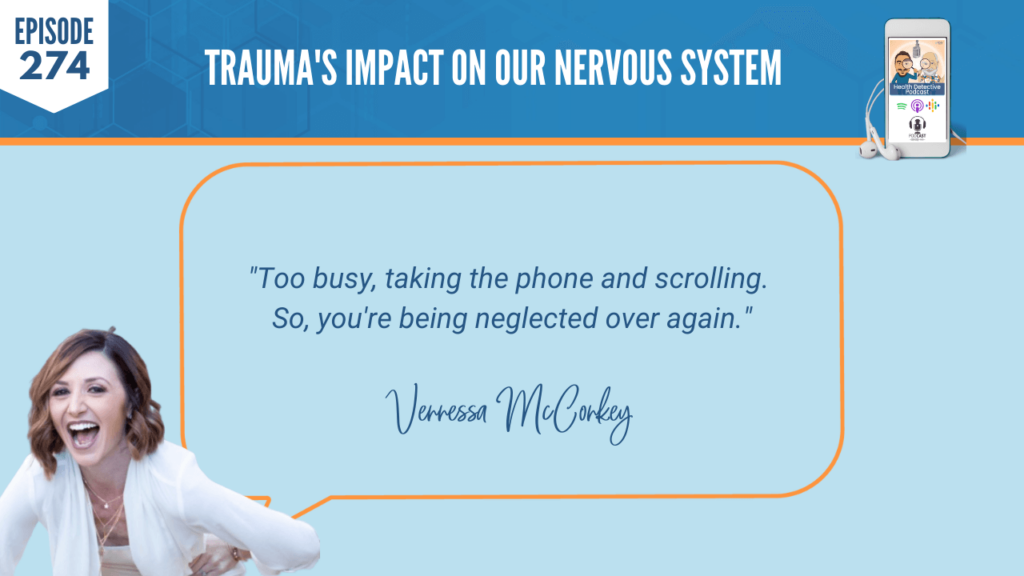
I’d be asking questions about childhood. Hey, mom, what was it like when this, and what was it like when that? Too busy, taking the phone and scrolling. So, you’re being neglected over again.
Trauma’s Impact: Constant Overload
When you’ve got someone who’s got a dysregulated nervous system, they’ve been through all of that trauma and it’s getting relived as an adult, how in the world do you think they’re going to heal? They’re not.
They kicked us out by the way. So, we’ll shorten that part of the story. They ended up kicking us out, no reason other than we were too much. We had to quickly find another place. My husband was still in Arizona. We had just gotten notice 48 hours before we were closing on our property that they were canceling the contract for no reason. You can do that, no reason. We’re like, oh my gosh. We had all of this debt. And we would have been like, thank God we would have been able to get Vennessa and the boys a place, everything. My parents were like, we don’t care, out. That’s not loving parents.
And that totally threw me into hyper vigilance again. The boys are like, what’s going on? Are we going to be at the same school? Cause they’d already changed. The oldest one had changed schools three times already and it hadn’t been a full year. It was like, all over the place. You can’t heal under those circumstances.
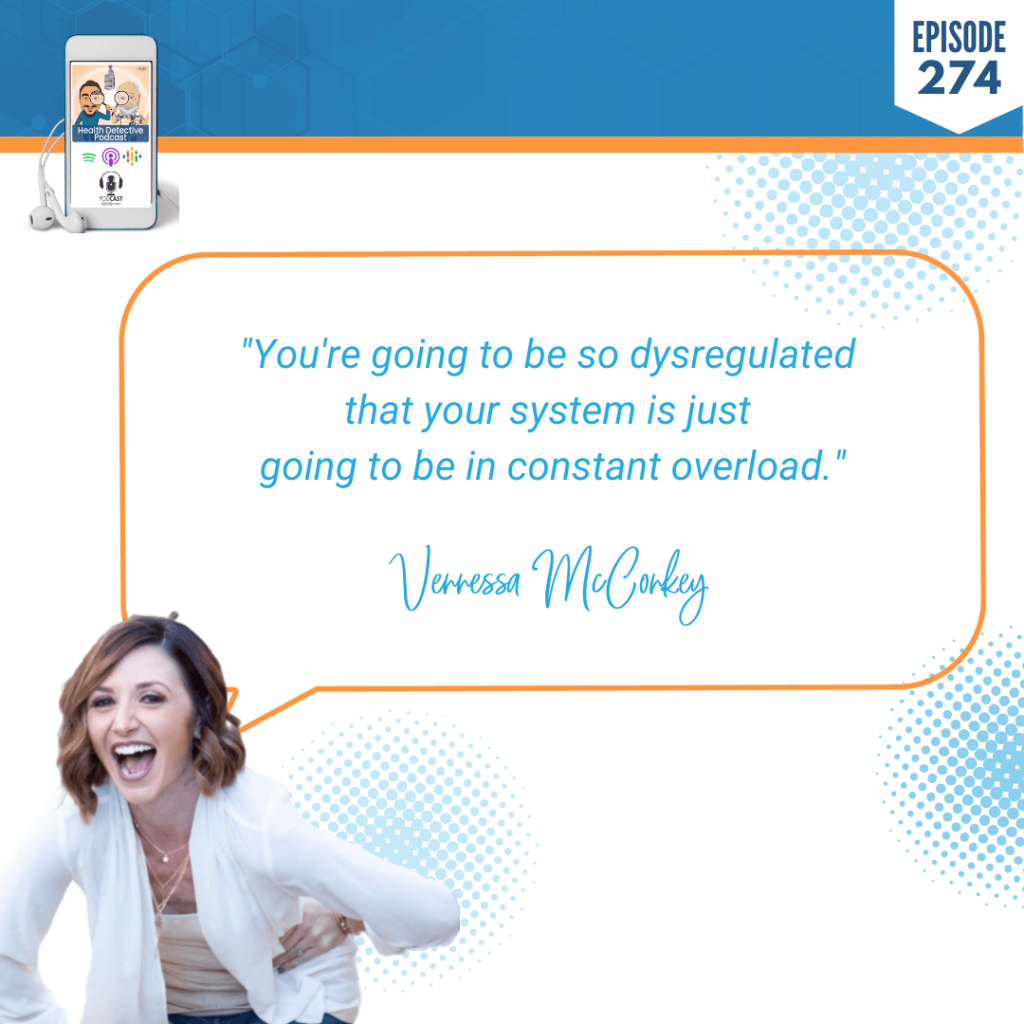
I say to a lot of people, are you safe? I’m not saying people are holding weapons to your heads or anything like that, but do you feel safe in your environment? Because if you don’t feel safe in your environment, first, you’re not going to heal in any way, shape, or form. I don’t care if it’s with a family member; I don’t care. You’re not going to be safe. And you’re going to be so dysregulated that your system is just going to be in constant overload.
Trauma’s Impact: The Gift of Hope
I sit there and go through it with clients; I do this with my kids too. We have a big feelings list; I have a big feelings list here. Because a lot of times when you’ve been through trauma and you’ve got a dysregulated nervous system, you don’t even know what you’re feeling because you’ve never been allowed to feel that. No one’s ever explained it to you. It’s just get out of my way, move, go. School should teach you that, all those things. And it really affects your health.
So, I sat there and thought about this a couple weeks. What are some gifts that parents can give their kids that are going to take them so far in life, help regulate their system, and teach them to just live life and not be afraid of so many things.
We already have enough freaking fears in this world that’s going to throw our systems off. We could just name COVID, for example, right? Everyone just go crazy. We don’t know what’s going to happen. Things are going to happen. We’ve got school shootings. Things are going to happen that we can’t control.
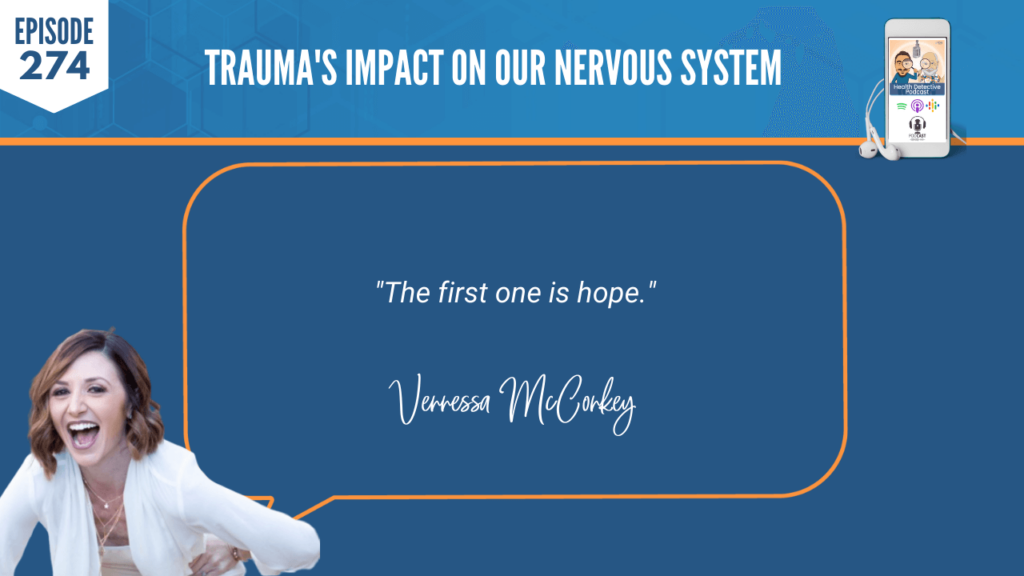
If you’re a parent, if you’re a teacher, if you’re a practitioner in any type, I feel like these three things should be things that you should be gifting the people. The first one is hope. Now, I’m a Christian and one of the only things, one of the biggest things that kept me going through the situation I was going through of moving back to Illinois, is my husband going to be clean or not. By the way, he’s 19 months clean now.
Trauma’s Impact: Hopeless
Am I going to be okay with my parents? Am I going to be walking on eggshells? I didn’t even feel like I could come home, like you come home to your house, your childhood home, a lot of us should feel the sense of, oh my gosh, I’m home. I can go open the refrigerator, grab something to eat, go lay on the couch and it’s okay. I’m at home; I’m with mom and dad. I never had that.
My parents actually got to the point when we were living there with the boys, labeling their food and counting it out. One, two, three cans of this. It was sick, but that was the childhood I grew up in. This is dad’s stuff over here. This is mom’s stuff. These are the kids’ stuff. If you’re out, you can’t touch mom and dad’s stuff. I’m sorry, you can’t. And that was rough. I was walking on eggshells.
So, having that hope of knowing God and knowing, like I questioned, like you’ve mentioned in the last episode about some of your story too, and reflecting that, but if you don’t have that life is a lot harder. You go into depression, isolation. We have enough of that crap as it is y’all, all kinds of health issues.
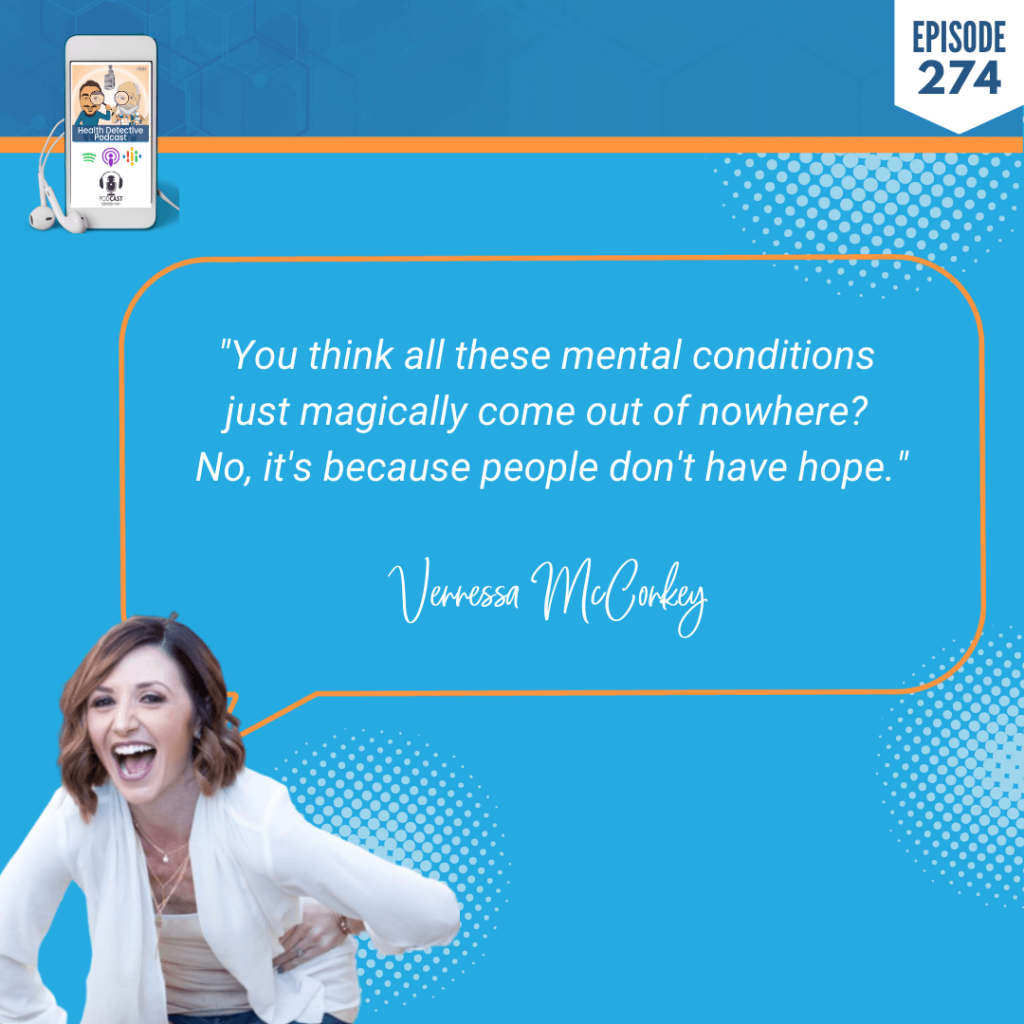
You think all these mental conditions just magically come out of nowhere? No, it’s because people don’t have hope. They don’t know what’s coming next. They’re waiting for that next ball to drop. They’ve been traumatized multiple times over and over and experienced it. They don’t know what’s coming next. Guys, you’re not going to be able to regulate their cortisol if you can’t help them fix that problem.
Trauma’s Impact: Chilling Out and Dealing with It
I’m not a therapist and none of y’all should be, okay. If you have an actual degree in that, yes, please help them. But refer them out to that, guide them and say, I can’t help you until you’ve gone to a therapist because you’re not going to be able to. No food, no supplement, no anything is going to help that nervous system calm down.
Just as we were joking before we got on here, I now, with every client call, we go through a meditation series. There’s deep breathing beforehand. Cause a lot of times we all rush in the calls. First of all, we’re busy people. Second of all, they’re on high alert. What are my test results? Oh my gosh, I got to know. What am I going to do next? How’s my life going to change? All these things.
You’ve been there.
[00:21:51] Detective Ev: That’s very real with clients. And I’ve been on the other side when I first got mine. Exactly. You’re just constantly going. So, this is just one more thing in the myriad of other things that you have to do.
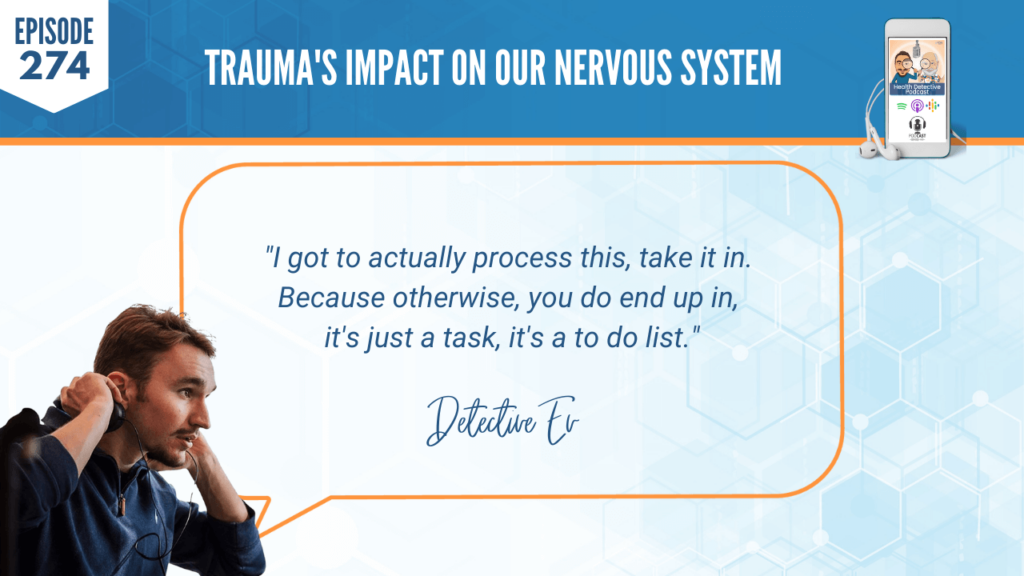
Really, I think everyone, if they want to heal, has to come to that conclusion at some point that this is not going to be like one of those other things in my daily life. I got to actually process this, take it in. Because otherwise, you do end up in, it’s just a task, it’s a to do list. All right, I’ll do this diet. I ate right today; I took these supplements. And then you wonder why you’re six months into the protocol and half as much better as the average person would be at the same point in the protocol. I totally agree with that.
Trauma’s Impact: The Fear Factor
[00:22:23] Vennessa McConkey: Exactly. And so, that’s the first thing that I always make sure. They’re going to lose hope. And we weren’t designed to be put on this earth to be constantly depressed, constantly isolated, constantly just hurting and in pain.
Now, we ain’t going to take away all that pain. That’s not our decision. We will guide you, but you have to do it. I don’t want to say the right way, but you have to be cognizant of what’s going on in that person’s life. You have to correlate, like we say. We correlate their lifestyle and their labs and their symptoms and all that stuff together. You got to dive way deep. And that person has to trust you. They have to trust you.
I literally just got a client, and she has spent over $80,000 in 18 months. Part of that, by the way, with one of our FDNs who didn’t solve her problem in any way, just gave her this massive protocol. She was like, whoa. But part of it, she had mold. That was uncovered down the way.
She was like, Vennessa, I’ve worked with you in the past in your career coaching business. I trust you, but I’m scared. And we’ve uncovered so many different traumatic things that have happened. Her just getting mold in general from the job she loved was traumatic. Then dealing with all of that.
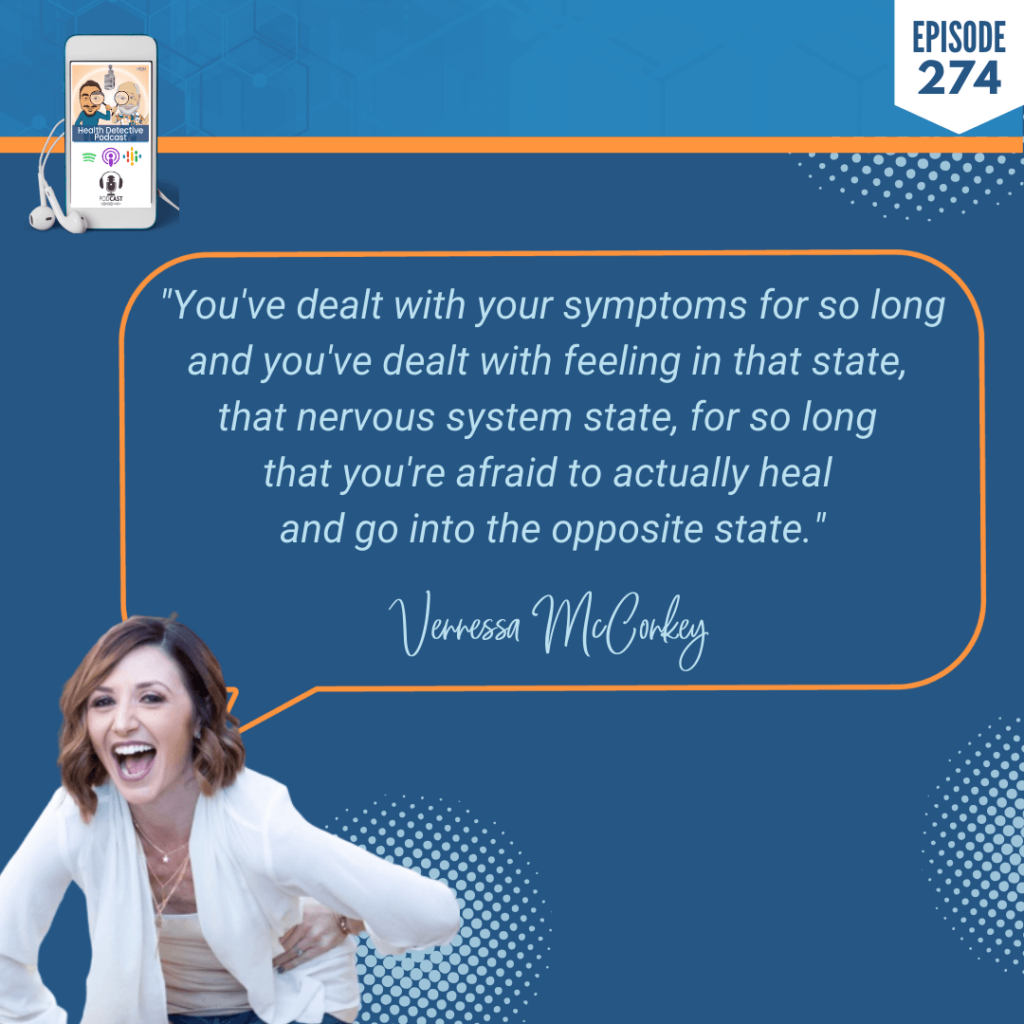
This is what happened with me too. And I don’t know if this is with you too. You’ve dealt with your symptoms for so long and you’ve dealt with feeling in that state, that nervous system state, for so long that you’re afraid to actually heal and go into the opposite state.
Trauma’s Impact: Safety in Consistency
[00:23:53] Detective Ev: You’re probably wording it better than I would have. But there’s definitely trends that I’ve noticed that have made me wonder about that. This is very tough if someone’s hearing it for the first time. You don’t almost comprehend it. That’s not saying that everyone has this, but also, if you do have it, it’s tough to hear the first time because it doesn’t always fully make sense.
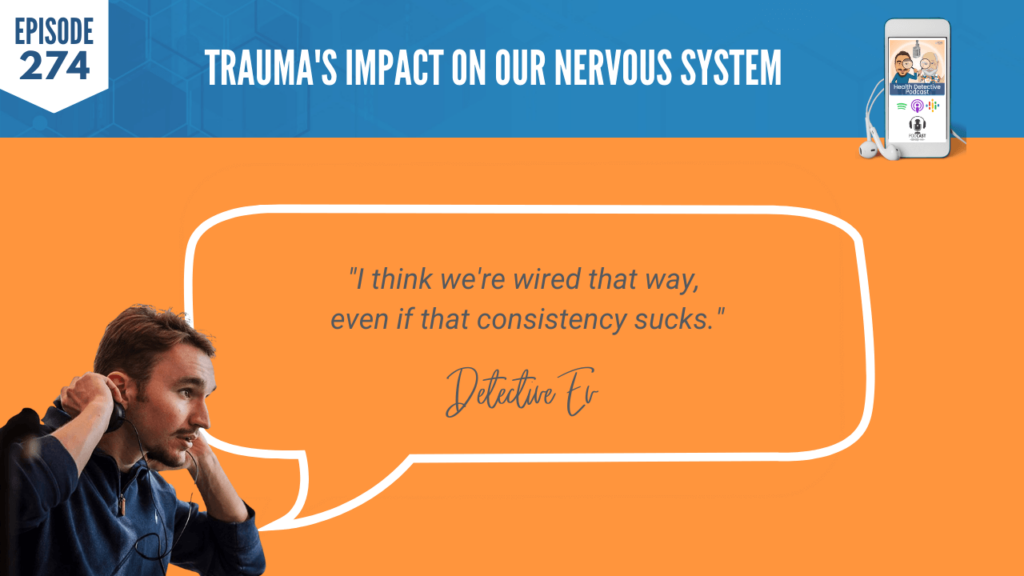
But there is a safety that comes in some level of consistency in life. I think we’re wired that way, even if that consistency sucks. I’m saying this personally myself; I won’t project it on anyone else. There was a comfort of a sorts in depression; there was a comfort of sorts in anxiety.
My biggest one that I found to be particularly tricky, this was a fascinating one, there was huge comfort in severe acne. Now, anyone would have questions about that. Why the heck would there be comfort in that? Every little thing that I would have to push for in life, whether it’s career, relationship, or whatever, those are social things that acne was this safeguard.
I figured if I have severe acne, it is totally justified that I’m not in the dating pool. It is totally justified that I’m not going for the better job. You look ridiculous, right? You’re embarrassed about this, that’s justified. I’m not Sigmund Freud myself, I can’t prove this, right? But I do believe that you’re onto something. And I have thought about it from hearing others prior to this podcast that, especially with the acne. Again, was that something that I prolonged to give me this safety?
Trauma’s Impact: Fear of Rejection
I’m not being rude if someone’s dealing with this right now. If you’ve ever dealt with severe cystic acne, yes, that’s not the easiest thing to date with that. That’s real. And the best lies are half true. So, that’s real right there. But what’s not real is this other part that I was hiding from.
I think what was actually worrisome is what if I get rid of the acne and you ask someone on a date, and they still reject me. Then it’s not the acne anymore. I don’t have this excuse. Maybe I’m going to feel inadequate in a different way. So, I don’t know. It gets very complicated.
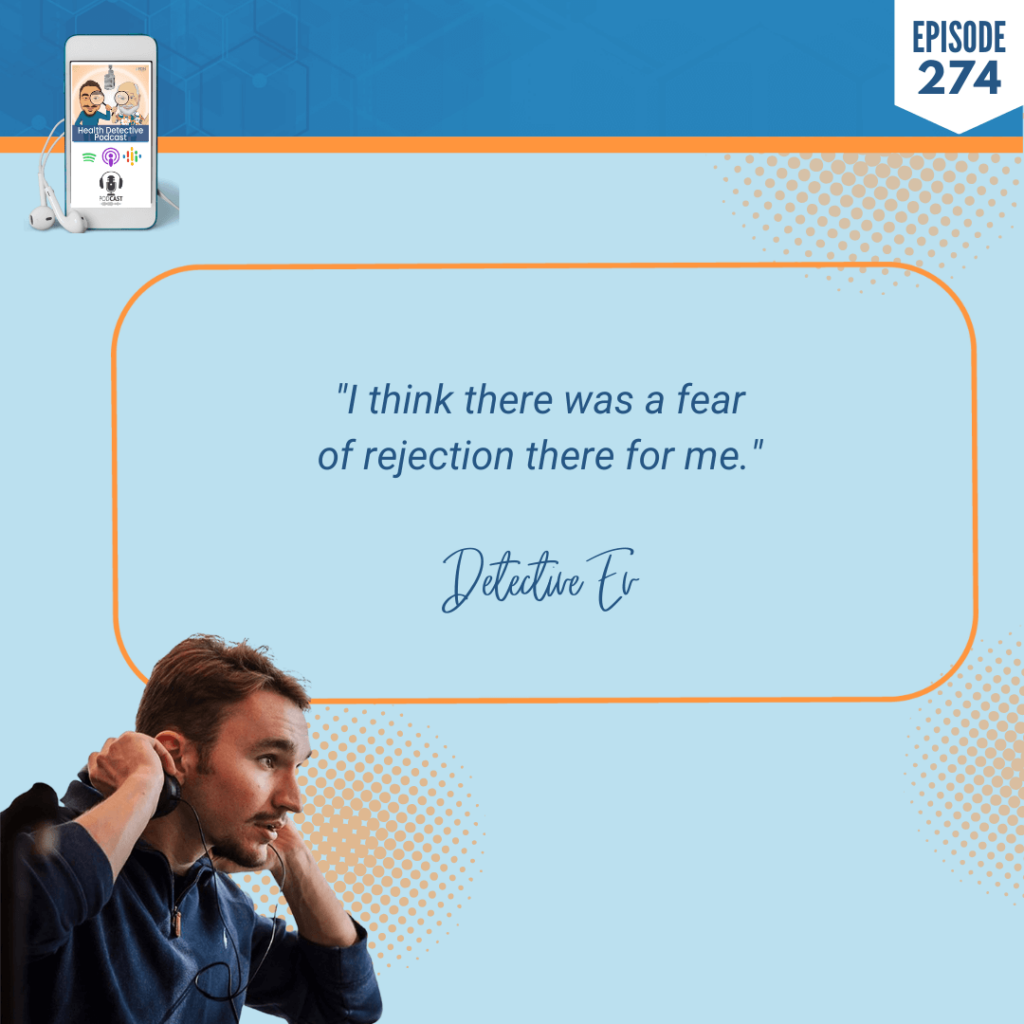
Or the job thing. If I never show up to the job interview, because “I can’t” quote/unquote, since I have this bad acne, I can’t get rejected from that thing. And so, I think there was a fear of rejection there for me.
I also don’t want to go off too long, I love listening to you. You are great at what you do. But I had to add to the hope thing if I may. I love that was your first thing out of, I think, the three. As someone who’s in the mental health space, as many of the listeners know, I genuinely believe hope is one of the only things that keeps people from taking their own life.
I have almost seen zero correlation between suicide actions, like actually making an attempt on taking one’s life or completing that, I’ve seen almost zero correlation between the pain and the suicide stuff versus the hope side. I’ve seen people that, to be dead honest, really, we’re only in a 5 out of 10 pain, but they’ve attempted suicide because they couldn’t see the light out.
Trauma’s Impact: Generating Hope
I’ve seen others that went through the craziest stuff, you couldn’t even make it up in a movie. But whether it was faith, whether it was something highly practical, oh, once I’m 18, I can move out. Maybe it was stuff with parents, they had this hope that might have been years away.
As a Christian, because I’m one as well, if you’re a person of faith, your faith and hope really comes after death. After all of this is done, the hope could be decades away. But if it’s genuine, all of a sudden, human beings, man, we’re tough. We can survive a lot of stuff. I wanted to add to that too because I thought that was great. You know, I think that’s one of the only things that keeps people from taking their lives.
I don’t work with the clients one on one as much at our studio. It’s mostly, I talk to them in the beginning and then they work with someone else there. It’s genuine, I never ever fake this. I look for the things that I see already. If I’ve heard another story on this podcast of someone that has healed from something similar to what they have or whatever it might be, I look them in the eyes and let them know, oh yeah, we’ll figure this out.
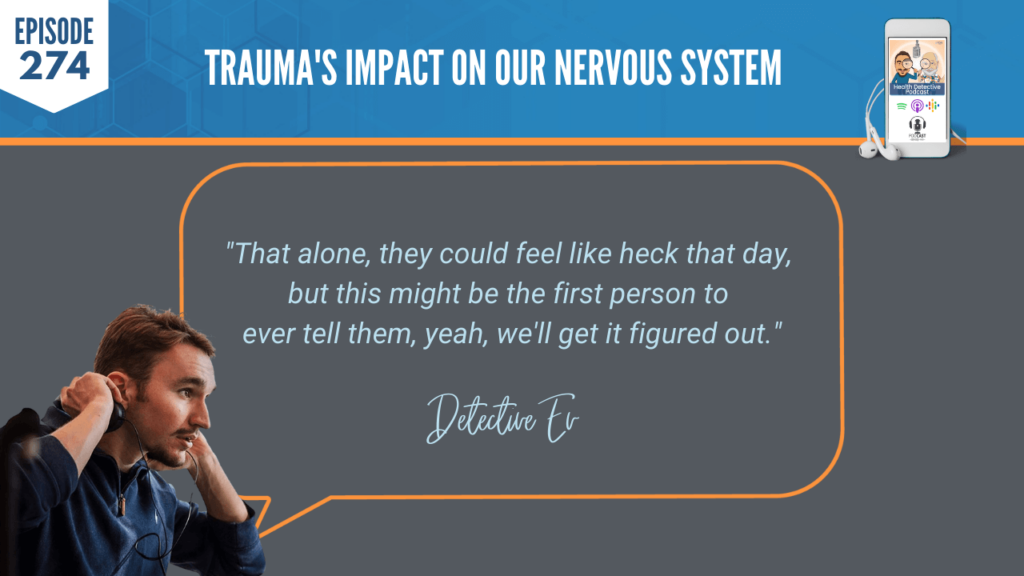
And I just say this with a confidence and conviction that they’re like so confused because they’re in the midst of this. Oh yeah, don’t worry, I see this all the time. And they’re like, what? But that alone, they could feel like heck that day, but this might be the first person to ever tell them, yeah, we’ll get it figured out.
Trauma’s Impact: Useless Affirmations
I always say, if I can’t figure it out, man, you’re talking, people like us, we’re the best networked people in the world for functional medicine. I will find you the person who can help you. It’s not arrogance, it’s genuine. I can get you to the person who can do this.
[00:27:57] Vennessa McConkey: Exactly.
I’ve got another client. She was messaging me this week. She goes, I don’t know if you’ve ever dealt with this, but I literally can’t stop crying. And I said, I know you’ve been through a lot. She goes, I never will attempt, but I just feel like if I was just not here, that it would be so much easier. I said, this is the toughest part, pushing through all of this.
And this is one thing, like please don’t tell people to do positive affirmations and you’re going to change what’s in here and you’re going to change everything. It takes a lot of time when you’ve been through significant amounts of experienced trauma. It takes a lot.
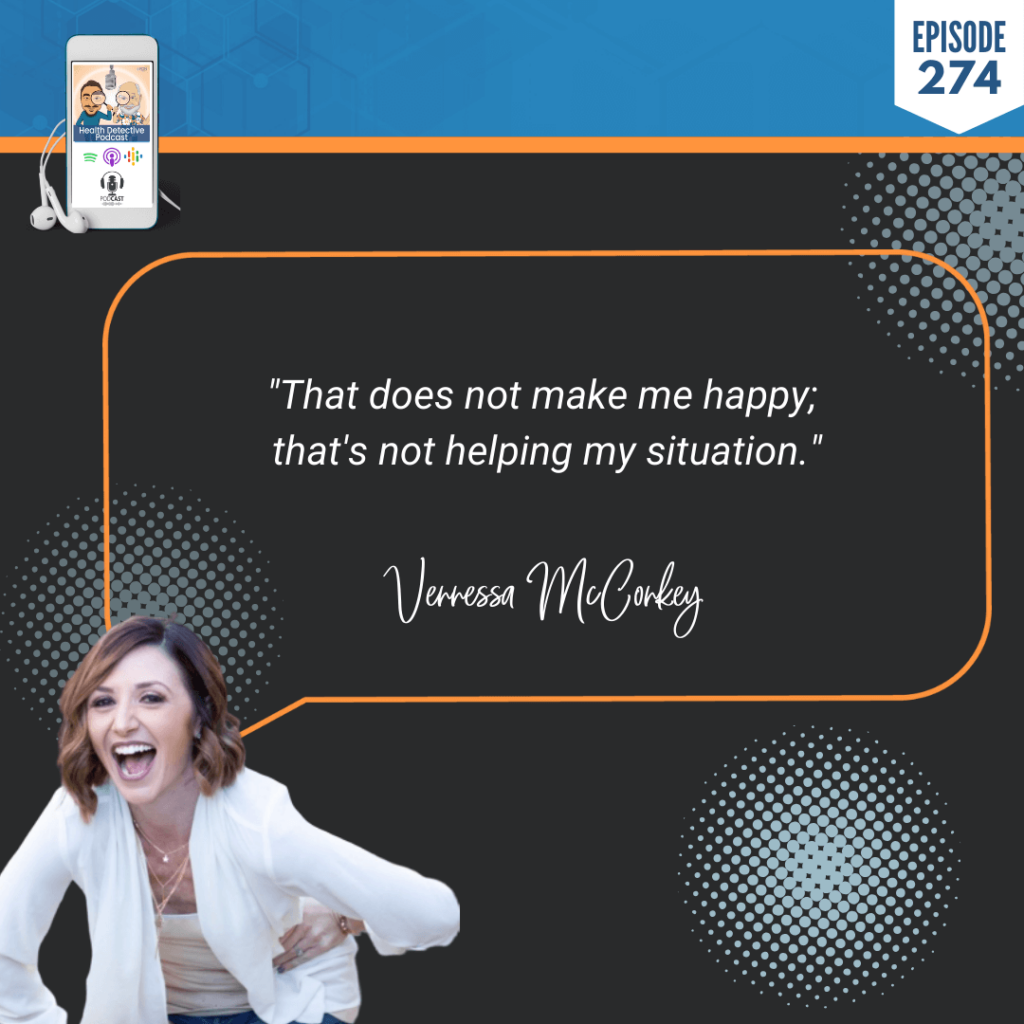
My dad was, oh yeah, speak positive affirmations. Listen to Joel Osteen every morning. I wanted to give him the middle finger. I’m like, sorry. That does not make me happy; that’s not helping my situation. I need you as a father, that’s what I need. They don’t understand that. And the client, themselves, doesn’t understand that.
But she’s like, Vennessa, I don’t want to take my life, but at the same time, I do. I’m hurting my husband; I’m hurting my kids. I said, no, here’s the thing. And this is what people don’t understand. You’re hurting them by not going through the steps of healing. You will hurt them more by not going through those steps.
Trauma’s Impact: Showing Emotions
When you have been traumatized, and we all have to some extent in some manner, but when you’ve been through that complex trauma and it doesn’t go away, it’s not something you can take. It’s lifetime y’all. Unfortunately, it’s lifetime. I’ve had to come to that conclusion for myself. It sucks, but the triggers will be less and less.
But here’s the thing, as you go through, you’re going to have less triggers. You’re going to understand what they are and you’re going to become self-aware. You know, you’re teaching your kids, which is what kids need to thrive.
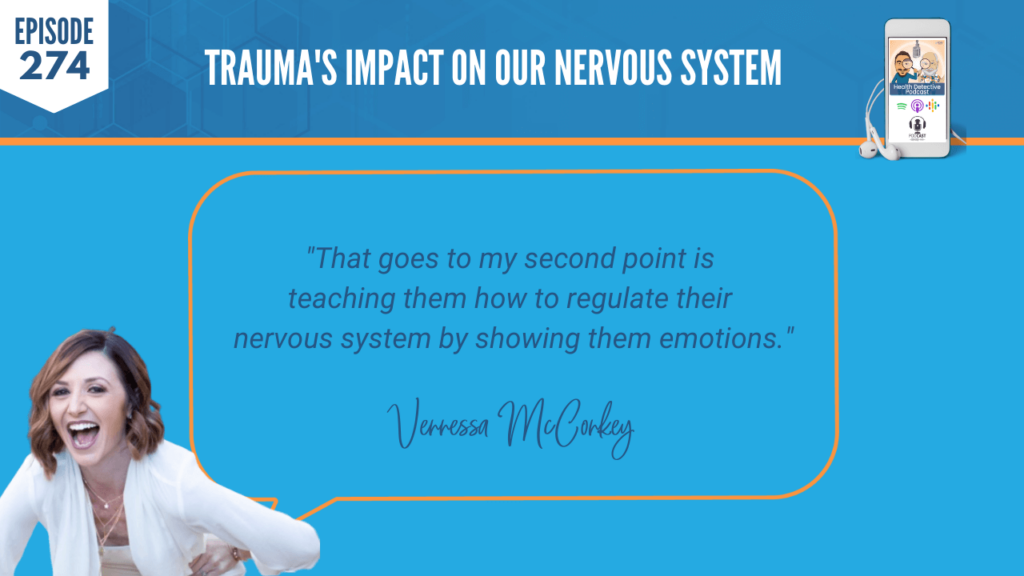
That goes to my second point is teaching them how to regulate their nervous system by showing them emotions.
I don’t know how many times, I got three boys, I yell at them every day. Every day they’re doing something, some annoying noise. They’re talking about poop and pee, whatever, anything. And they’re like mom, you do poop tests. I’m like, yes, I do. But let’s not talk about it at the table.
My oldest one, we had gotten his GI stool MAP test back. But before he sent it in, the kid’s legit. He’s like, I got it, mom. I can poop in the hot dog containers. That’s what he calls it.
[00:30:21] Detective Ev: I call it the french fry container.
[00:30:27] Vennessa McConkey: He’s eight years old, by the way, okay? No joke, I’m in the kitchen making dinner, He’s like, I gotta go, I gotta go. I’m like, okay, you know what to do, the stuff’s in there. If you want to handle it, go for it. I don’t want to stick my hand under and do it for you.
Trauma’s Impact: Feeling the Big Feelings
He comes out and shows me, he’s gotta show me. I’m like, okay, alright. He’s like, can you take a picture and send it to Daddy? No, I’m not. That is too far.
But you’re going to have so many situations as parents and you’re going to have to show them emotions. If you’ve been through the trauma, it’s going to be harder. But when you have those aggressive feelings, what we call the big feelings with kids – anger, fear, crying, all that stuff – you have to feel it.
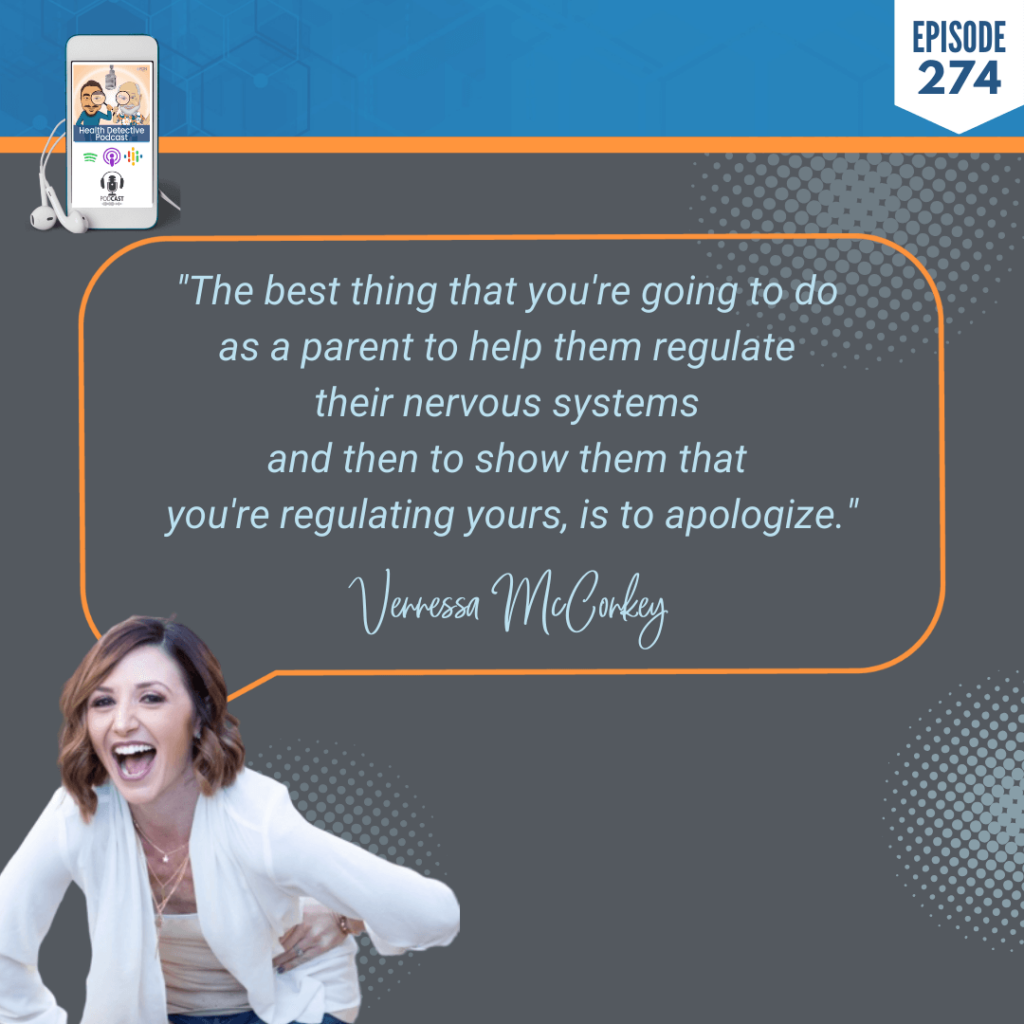
And then the best thing that you’re going to do as a parent to help them regulate their nervous systems and then to show them that you’re regulating yours, is to apologize. Sit there and be like, you know what, mommy did have big emotions. I didn’t mean to yell at you. I’m human and this is how we regulate.
I needed this back wall here to change spots here, but we usually have big sets of pictures up on here’s how you can regulate your emotions. Here’s what you can do for anger. Instead of screaming or throwing, or yesterday was throwing swords at each other. Yeah, I was like, where did you get those and what just happened here? But it’s here, you can push up against a wall when you’re angry, it pushes it out of you. We’ve got so many freaking stuffed animals. Cuddle a stuffed animal. We have a new puppy. Cuddle the puppy until she growls at you. Just do those different types of things.
That’s a great gift to teach your kids. Because you know what happens when you go into the workplace and you have something that drops a bomb on you, what are you going to do?
Trauma’s Impact: Educating Clients
My husband, I deal with all the time. He is now, it’s basically like he’s a dry drunk. He was able to use substances before to calm anger and to calm frustration and overwhelm at work. And now, he’s like, what do I do? What do I do? Oh my gosh.
I don’t know how many times things have happened, and okay, please go, take some time, remove yourself from the situation. There’s been times he spent four hours in the basement curled up in a ball. So, it’s like regulating and showing your emotions, your body needs this.
And I don’t know if I said this in the last episode. I’ve said it on other podcasts before. But when you’re a trauma survivor, you just want one day to be just okay, easy peasy, like nothing, no ups and downs. Let me tell you, what does a heartbeat do? It goes up and down and up and down and up and down. You have to have that type of nervous system.
You can’t always be up, and you can’t always be down, and you can’t be just right in the middle. You’ll be dead. You have to teach the system that when you go up, you have to come down. When you’re down, you have to go up. You have to be able to teach that to children.
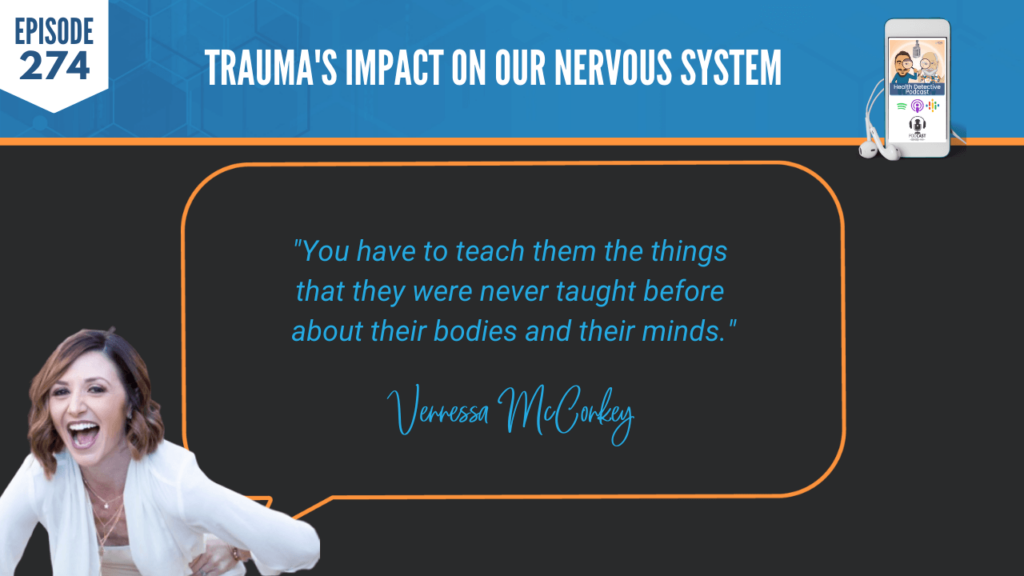
This is what I’ve been telling a lot of practitioners that I talk to as well. Your clients, you’re like a parent to your clients, especially if they’ve been traumatized. You have to teach them the things that they were never taught before about their bodies and their minds. You have to, otherwise they’re not going to heal.
Trauma’s Impact: The Importance of Regulating
You’re not going to be able to give them your protocol that is an amazing protocol, usually. You can’t give it to them because they’re not going to be able to accept it. They don’t have other tools in place. Your job is to be able to set up their nervous system.
Yes, we have our D.R.E.S.S. and I fully support the D.R.E.S.S. It starts with the diet. You got the rest; you got the exercise. But it really doesn’t start with diet. With my clients, I start with stress and the nervous system. Because I can’t input.
I don’t know how many different freaking diets I did, like I said earlier, all the different sensitivity tests and things like that. And I was like, how am I getting worse? How am I getting worse? I know I might get a little worse that first week or two, but I should be getting somewhat better. Like, why am I not getting better? Why do I have more sensitivities? What in the world is going on? What am I going to be able to eat? My gosh, I’m supposed to be working out 30 minutes a day. I’m lifting weights because I’m supposed to gain testosterone because I have a lack of testosterone, but like it’s getting worse. What’s going on?
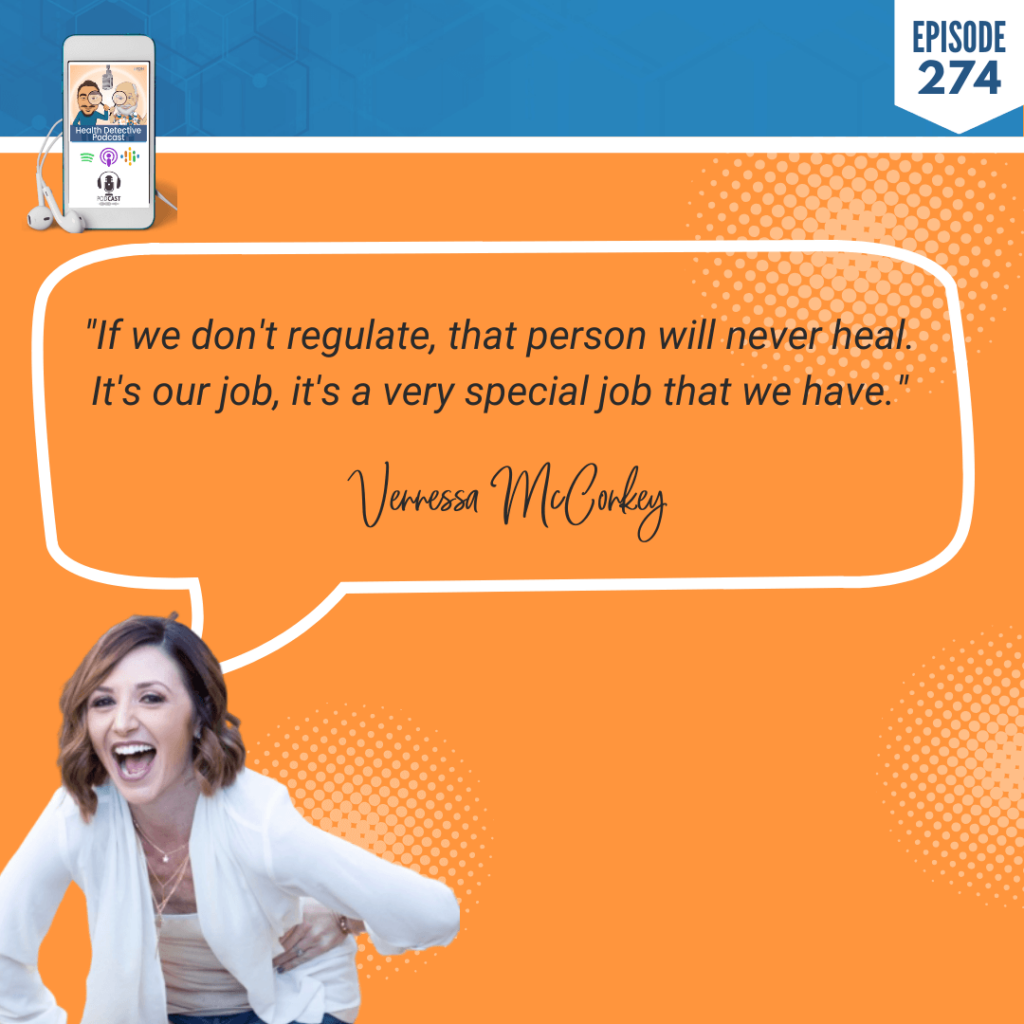
But if we don’t regulate, that person will never heal. It’s our job, it’s a very special job that we have. And if you don’t take it seriously, just like being a parent, you’re going to lose that person and they’re going to struggle for the rest of their life. Just like I started off, for 40 years now, of struggling as a child. I still call myself a young child because emotionally sometimes I can still be there.
Trauma’s Impact: Trauma Strategy
I never want anyone, if I can help it, go through that again, ever. We’re not perfect, our kids are going to go and do things that we say not to do, the clients are going to do the same thing. But if you can at all help it, put those principles in place, make sure. You can’t just say, go reduce your stress.
I don’t know how many times I had doctors say that, by the way. You just need to reduce your stress. I’m like, if you would have taken the time, understood, and asked me questions about what was going on in my life, you might have been able to connect the dots. And I’m not saying other doctors out there are bad.
[00:35:31] Detective Ev: Defines stress, right? Because stress could be something very technical, sciencey, nerdy, like FDN. It could be a bug, right? But at the same time, yeah, it could be this trauma. Their version of reduced stress, they mean well, but it’s so limited in scope. It’s not exactly the stress reduction they’re talking about. And for 95% of sick people, that’s not going to come.
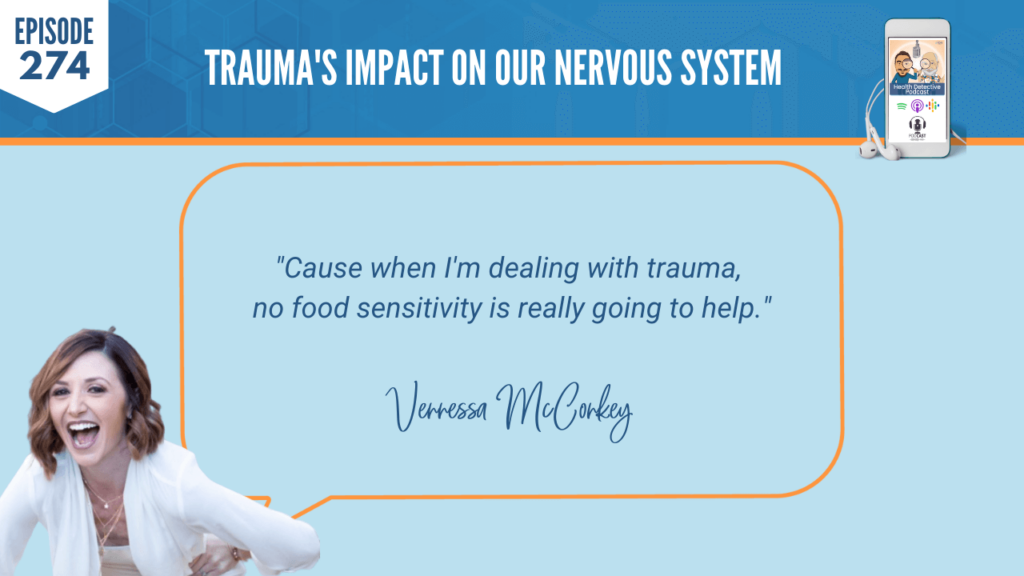
[00:35:53] Vennessa McConkey: That’s why I don’t use all of the foundational labs right away. I start with the hair tissue test. Then I do the GI MAP and the DUTCH because those three combined show me. When I’m dealing with trauma, no food sensitivity is really going to help. Unless you have an allergy, it’s not going to help right now.
I had a calcium shell. If I would have had a practitioner show me that years down the road, my body was actually protecting itself. It’s literally what it is, calcium, one of the toughest minerals, put around every single cell in your body.
Trauma’s Impact: Trapped Feelings
So, nothing’s going out, nothing’s coming in. I couldn’t detox metals. I have detoxification issues because of that. And the only way you’re going to be able to reduce that is by working on your nervous system and doing some different types of stress techniques, right?
Don’t tell me to go work out. I need to be doing things like somatic exercises slow, and breathing, and feeling my body. Because when you’re in the trauma response that I dealt with, I’m just going all the time. I have no idea what my body felt like, I have no idea. And I feel things and I’m like, that’s weird.
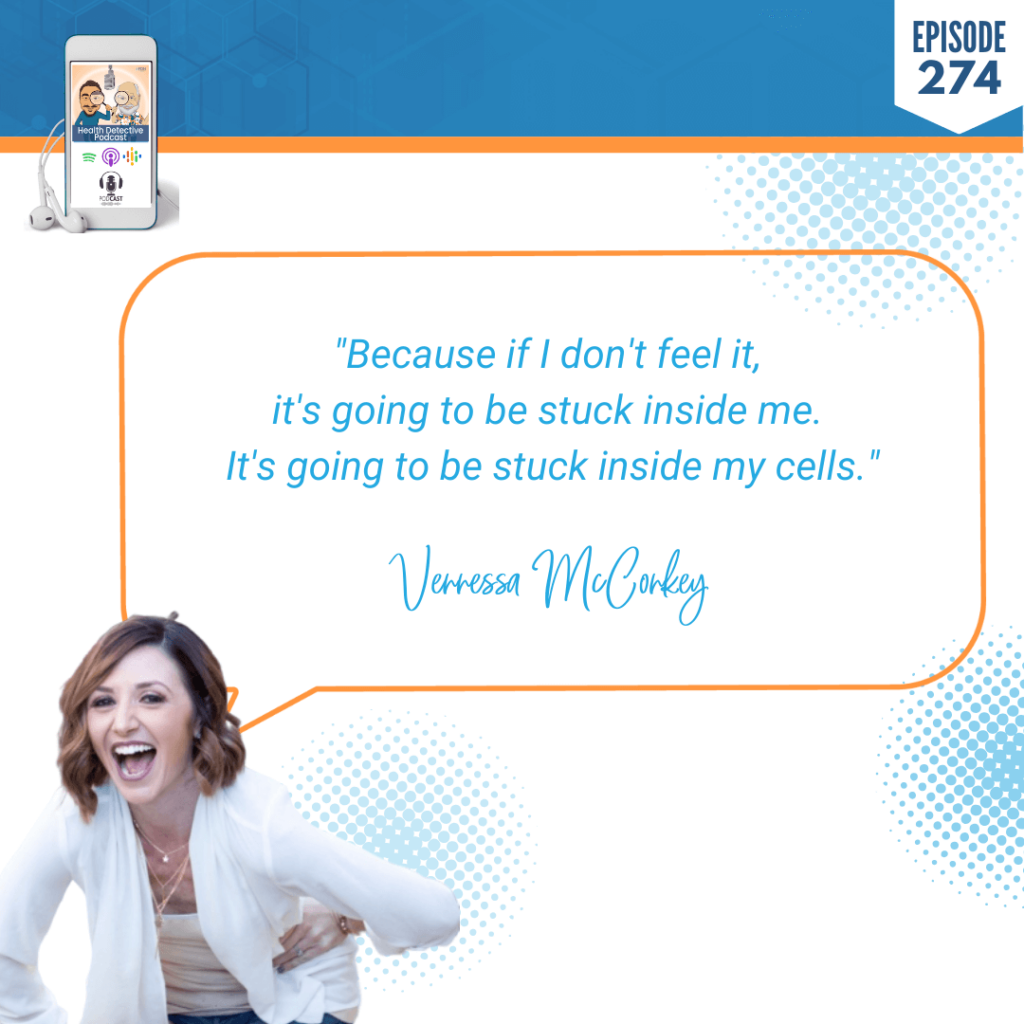
So, I want to bypass them. I’m like, no, I need to feel that emotion. Because if I don’t feel it, it’s going to be stuck inside me. It’s going to be stuck inside my cells. It’s not going to move. And it stinks at first. You’re like, what in the world is going on?
When you have that hair tissue test, when you have the GI MAP, cause I found out that I had H pylori, Candida, infection galore. My body was just like, leaky gut, hi! How are you? Let’s just feed everything. Everything’s going everywhere, but still not getting in your cells. And it was a problem. I was eating all the things that you weren’t supposed to eat for leaky gut, right?
My job has been able to help people go back and understand through those tests. And then we say, hey, we’ve got a thyroid issue. Hey, we’ve got other things down the road.
Trauma’s Impact: Having a Plan
Then, yes, we go into food sensitivity, metabolic type, all those different things. First of all, it’s going to overwhelm a trauma survivor. They’re going to be like, once again, something is wrong with me. We don’t want to do that.
[00:38:03] Detective Ev: We have so many people that come on that have done FDN, especially if they’ve been doing this for a while or had other experiences or whatever it might be, certifications, they mix their own thing. And that’s why FDN doesn’t regulate people, right? They can technically do it how they want. I think this is a really good example of you knowing your client base extremely well and that this is what’s going to best serve them.
For me, we attract a lot of cystic acne clients. Now, there is trauma there. There’s definitely the psychological and emotional trauma that can come with that. But quite frankly, a lot of those times those people are looking for the steps to take immediately and it’s actually comforting in a sense.
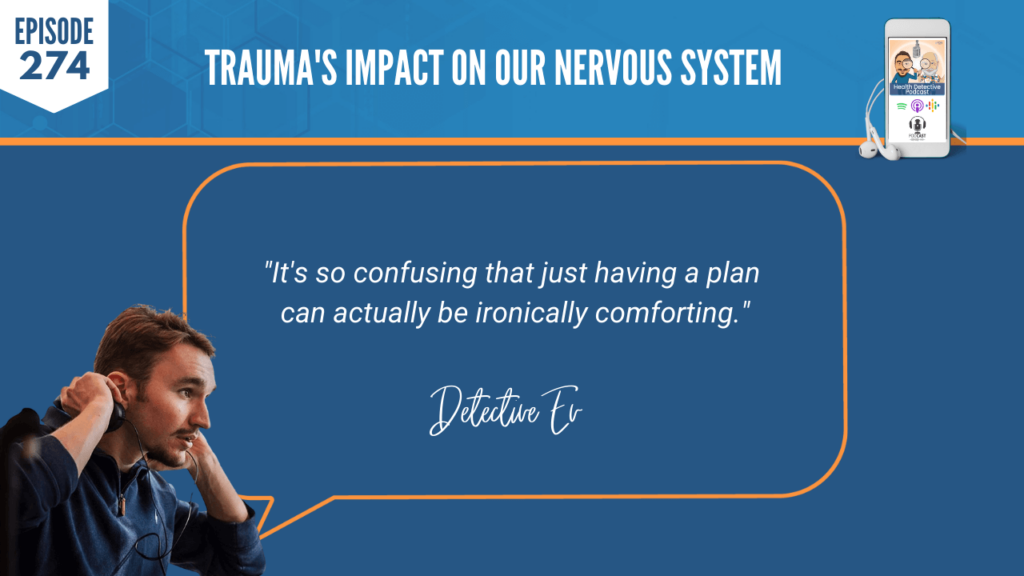
Because when you have cystic acne, nothing works, right? Like literally nothing works. You think it’s this food, it’s not. Or you think it’s this thing, it’s not. It’s so confusing that just having a plan can actually be ironically comforting. But my point, it’s really just a comment. I think it’s cool that you know your clients’ base so well that this is what’s going to work with them.
And I would agree, just using common sense, if you gave a huge protocol to someone who really needs to work on the trauma first and foremost, that’s just, yeah, more overwhelm or at the very best, which is still not good, it’s just another thing to be neurotic about and try to be a perfectionist with.
Trauma’s Impact: Being Vulnerable
Then we’re all going to fall short on every protocol that’s ever been created, as I have a million times. And that’s just, bam. Hit you again.
[00:39:19] Vennessa McConkey: No good.
That goes back to what I posted in our Facebook group probably like three or four weeks ago. It was speaking to me, but it apparently spoke to a lot of other people. Sometimes I have to post that stuff out there. I’m like, okay, Vennessa, if you’re feeling it, someone else is feeling it too. It’s not about what we know. You can get all these certifications, learn about all these different tests, you can, whatever. It’s about who you are and your story.
I think we did write a FDN where we do like a seminar or something, talking about our niche and things like the best thing that you can do is share your story and your experience. Yeah, you can share client testimonials, things like that. But how are people going to trust you if all you’re doing is feeding off of other people and off of just sample test reports and things like that? People relate to a story.
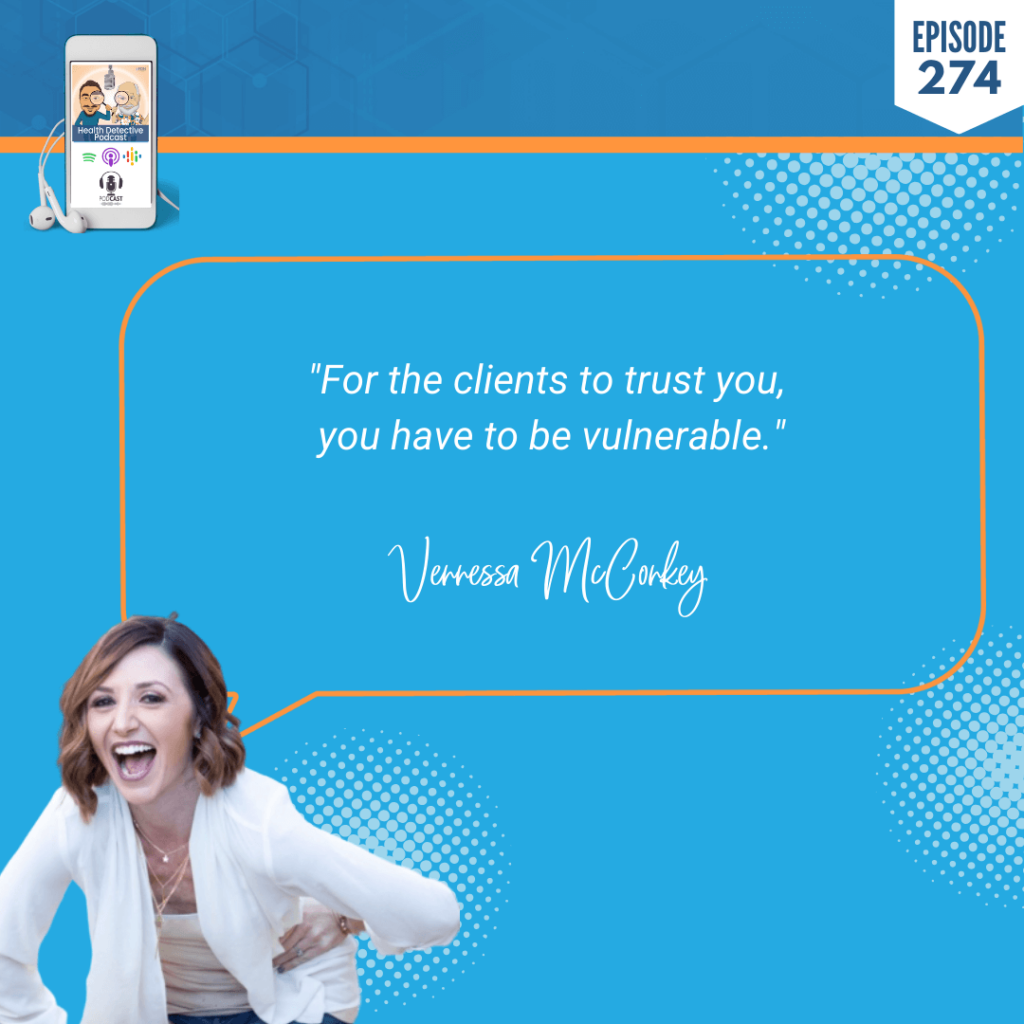
I told this to people all the time in the career coaching world, too. You can put whatever you freaking want on a resume. Great. But what is your story that you are going to tell? And how is that going to carry you through your career? You have to do that. And that’s why it’s really important. For the clients to trust you, you have to be vulnerable. You’re very vulnerable. I’m very vulnerable in this stuff.
Trauma’s Impact: Sharing Your Story
It’s hard at first, cause you’re like, what are people going to think about me? My story is really bad. It sucks. I was a substance abuse user, I had acne, and all this stuff. Or, hey, I thought I was this perfectionist and then I marry a substance abuse user. Right? Who’s going to listen to that story? I grew up in a Christian home and then it was used against me and kicked me out and all this stuff. I thought I had it together.
Y’all, I’m going to tell you if you’re an FDN practitioner, you’re thinking about it, you’re never going to have it all together. You’re going to get that one client that is going to drill you with questions and you’re going to be like, I don’t know. I have no idea; I don’t know what’s going on here.
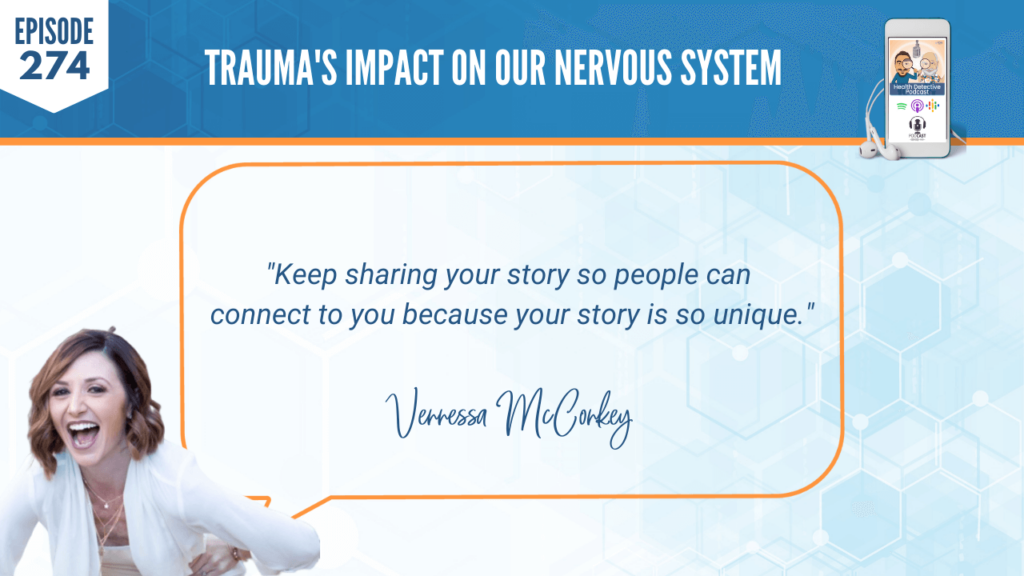
Your nervous system is going to get dysregulated. And you’re like, what’s going on? Then you’re going to be like, what do I do? That’s why we have all of these practitioners, so you can reach out, connect, network, and then you can learn from them. But keep sharing your story so people can connect to you because your story is so unique.
My umbrella company is Designing the Best You, right? If you’re not designing the best you, and that’s really hard for trauma survivors, cause you’re like, who was I? This is another thing too, as a client is healing, as you’re healing, as they’re healing, you’re not going to be the same person, right? A new creation, right?
We know that in Christianity, you’re a new creation. What does that look like? We have no idea what that looks like yet. We have to have that hope. That faith.
Trauma’s Impact: Having a Work Ethic
We’re putting that trust in the practitioner. We’re putting the trust in the process. I don’t know how many times I have to tell clients, okay, let’s wait. Let’s trust the process. We’re going to have to tweak it a little bit, but please trust the process. It’s going to be okay. But that’s the tough part, to go through that.
And the third thing, this can only come, this gift that you give your clients, that you give your kids, this gift can only come after you’ve done the first two, after they’ve experienced those first two of having hope, and you teaching them how to regulate their nervous system is to have a work ethic. Now notice I didn’t say hard. I did not say hard. A work ethic. Because when you’ve worked on designing who you’re supposed to be, you don’t have to work hard; we don’t.
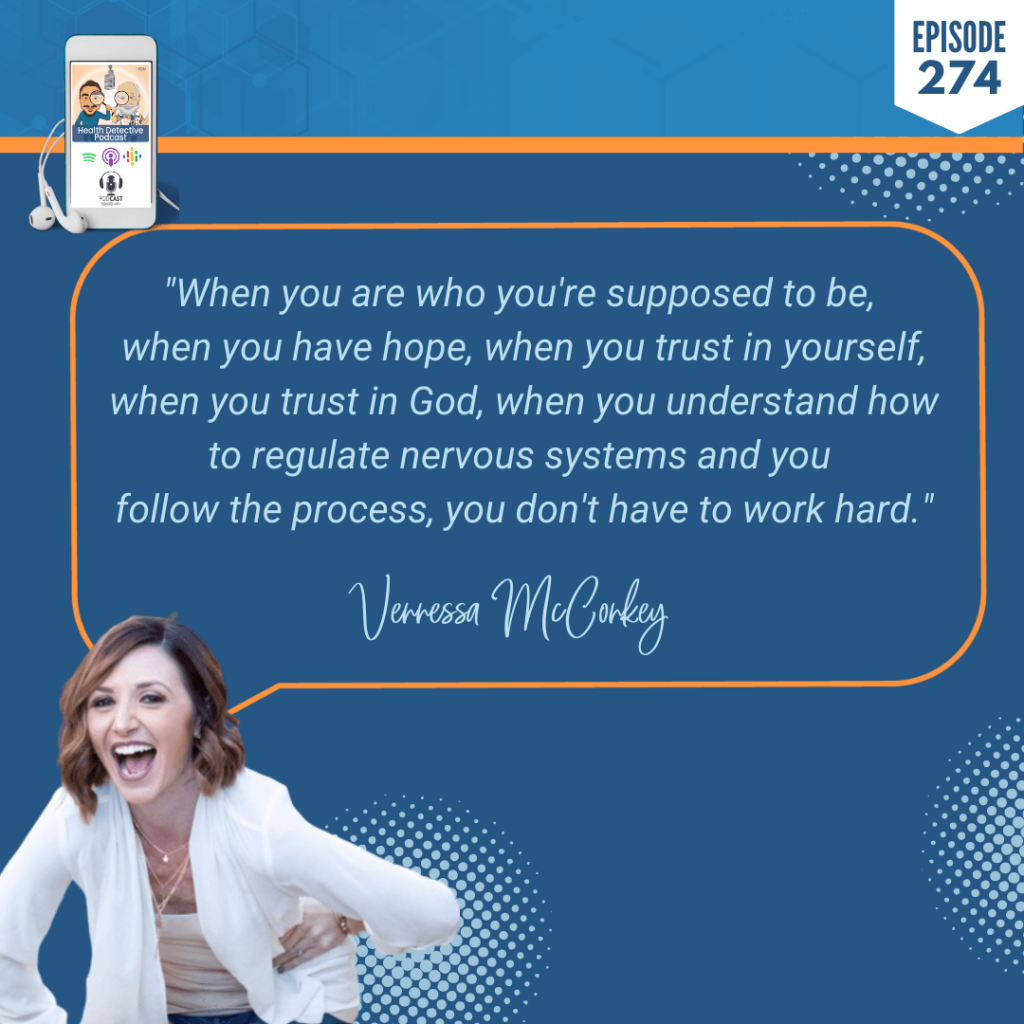
We push so hard in our careers, we push so hard to be good parents, we push so hard to be good spouses, good FDNs. When you are who you’re supposed to be, when you have hope, when you trust in yourself, when you trust in God, when you understand how to regulate nervous systems and you follow the process, you don’t have to work hard. You’ll already have a decent work ethic in place.
[00:43:14] Detective Ev: I forget if it’s Steve Harvey or who the heck says it, but it’s something along the lines of your gift is what’s easy to you, but amazing to the world.
And it’s tough. I didn’t do this intentionally, but as you get healthier and you learn about yourself and fall more in alignment, public speaking is an easy one, right? Something that you and I both enjoy.
Trauma’s Impact: Being Intentional
To other people, many other people, actually, that’s torture. You couldn’t give them enough money to do it. I’m like, put me in, I’ll do it for free. I’ll pay you to be able to do it. When you find those things, it’s incredible because, yeah, it’s just different. Maybe everyone worked the same eight hours that day, but you’re still feeling great afterwards and they’re feeling very drained.
I like what you said about that. The healthier you get, the more you can fall into alignment with these things. It’s extremely important. That’s a part of healing too. My gosh, if you don’t hate the 40, 50, 60 hours a week that you’re working, that’s a pretty dang good start in your healing. Trust me. I think that’s a major thing that many people miss.
[00:44:07] Vennessa McConkey: As we’re getting close to our time here too, I really encourage practitioners as you’re going and you’re working with your clients is to be intentional, to really step back.
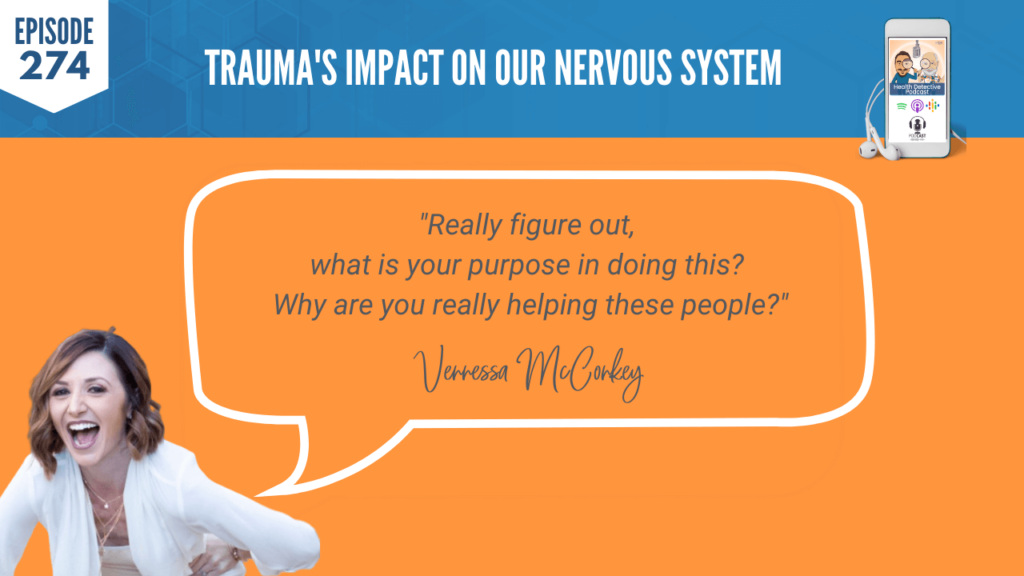
Cause we all do this. We’re like, we’re in it because it’s financial freedom. We want to help people too. But really figure out, what is your purpose in doing this? Why are you really helping these people? Is it because you want a number of clients to have the testimonials because you’re afraid to share your story? You’re afraid to be vulnerable.
Share the whole story, by the way, right? You know this from being in substance abuse. You’re like, I’ll just tell them a little bit. They don’t need to know all of it. Is it the money or are you really being intentional?
Trauma’s Impact: Getting to the Root
I tell this to people all the time. If I can just help one person be better than they were when they were under all of whatever influence they were under, that’s all I need. But I know God’s got more for me. It’s a scary big plan that he’s got for me.
But you have to sit there and think, I need to be intentional. It’s not about how many labs I can run. We don’t work to keep the numbers in the labs. It’s just information. But we have to understand, are we really helping them be all they were designed to be?

Because like I said, in my first episode, I stopped really diving in full time to my career coaching because people were just like, I want the next job, I want the next amount of money, I might want the next role. There’s a reason that they actually wanted that because they were pushing something else away. We have to understand that and get to the root of that. Otherwise, they’re going to keep striving for something that is so unattainable. And as a trauma survivor, you’re always wanting to please in some manner. We got to stop that because that’s not what the world needs.
[00:45:52] Detective Ev: Yeah, I caught myself doing that with money, which sucks because it’s such a generic one. I’m like, give me something cool. At 18, first of all, I had very supportive parents, even through all the stuff that I dealt with.
But there really was a point, 21 years old, I had, I think, about $50 left. I didn’t have any debt at the time, thankfully, which is great. But we’re neutral, like we’re zero. It’s, holy crap, like we got to figure something out here.
Trauma’s Impact: Operating with Old Habits
Thankfully, over the last seven years, I’ve been able to build a very nice income, which is cool. And we keep working on that. But I was always rushing around at that $50 mark.
To be fair, maybe some people disagree with this, I do think you got to put in some extra effort. You want to be doing it creatively to make sure it’s not forever, but yeah, put in some extra effort so you’re not at 50 fricking dollars.
The thing was, I realized I was at a point where the bills are getting paid, you’re good, you can throw some stuff into savings, you can pay off any of the debt that accrued, and now you’re building, right? You build the income, and you build those things over time. But I’m still going at 100 miles per hour.
I don’t want to compare it directly, because that, to me, was like a very micro trauma in the grand scheme of things of life that I’ve dealt with, or many others dealt with. It was interesting to see how easily you could fall into that habit. This was as an adult I started this, 2021, versus the stuff that we start at five or six as coping mechanisms. And you’re right, some days we have to just look and say, why am I doing this? Or just, hey, I need a break. I just want it to be easy for a day.
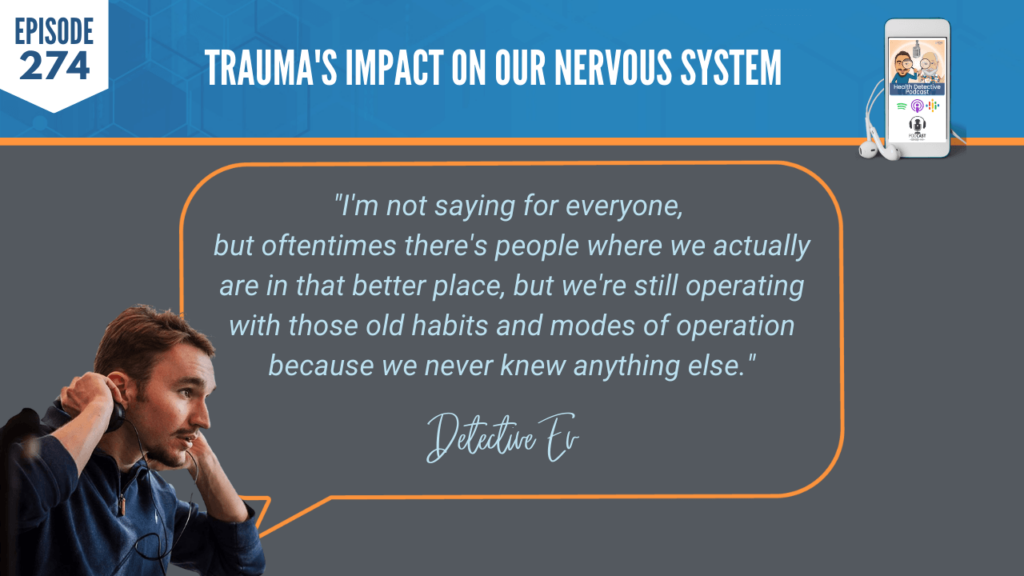
I’m not saying for everyone, but oftentimes there’s people where we actually are in that better place, but we’re still operating with those old habits and modes of operation because we never knew anything else. I’m like, dude, the money’s okay. When is this going to stop? I think that’s a really helpful question.
Trauma’s Impact: Money Mindset
I’m not a trauma expert. Certainly, you’re significantly better versed than me, but I don’t know if you agree with this or not. I find that’s a helpful thing at least to get moving in the right direction. You ask yourself about the behaviors that you’re doing. I asked myself this with the go for money thing.
Okay. So, when does this stop? What’s the goal? And I realized there wasn’t. At least if I had a certain amount, it’s a little better, assuming you actually stick to it when you hit that amount. But there wasn’t even an amount. It’s just let’s just keep going. So, this has nothing to do with money then really does it? It’s like a fear of what that felt like before when you didn’t have it type of thing.
[00:48:03] Vennessa McConkey: Exactly. Yeah, we grew up and it was like we never had anything. Oh, mom she fried flour balls for us and all these things. And you’re like, okay, that’s just like freaking tortillas. That’s what it is, mom. Come on.

But then we have that same money mindset. Then you start freaking out as a practitioner. What am I going to charge? What if it’s not enough? Or what if it’s too little? But you know what? I don’t deserve enough. And we never had that growing up.
But if you don’t have a plan, that’s why I say, I took a break after I became an FDN, and said, okay, it was a lot of work, right? But let’s get calm. Let’s see what is my intent. What is my niche? And that took a little bit too, but what is my intent?
Trauma’s Impact: Setting Detailed Goals
Do I want to help X amount of people? Or do I want to make X amount of dollars? Those do correlate, yes. But what is my ultimate goal? And like you said, when I reached that goal, then what? How do I want to feel around it? Do I want to feel the same way that I did in childhood? Oh my gosh, am I never going to have enough?
My husband’s the opposite. He’s let’s just spend, who cares. It’s going to come in at some point. I’m like, no, we have to save for something. But what is going to be that feeling around it and how are you going to change it now as you’re healing from trauma, as you’re healing from all of your health issues, things like that. How do you want to feel?
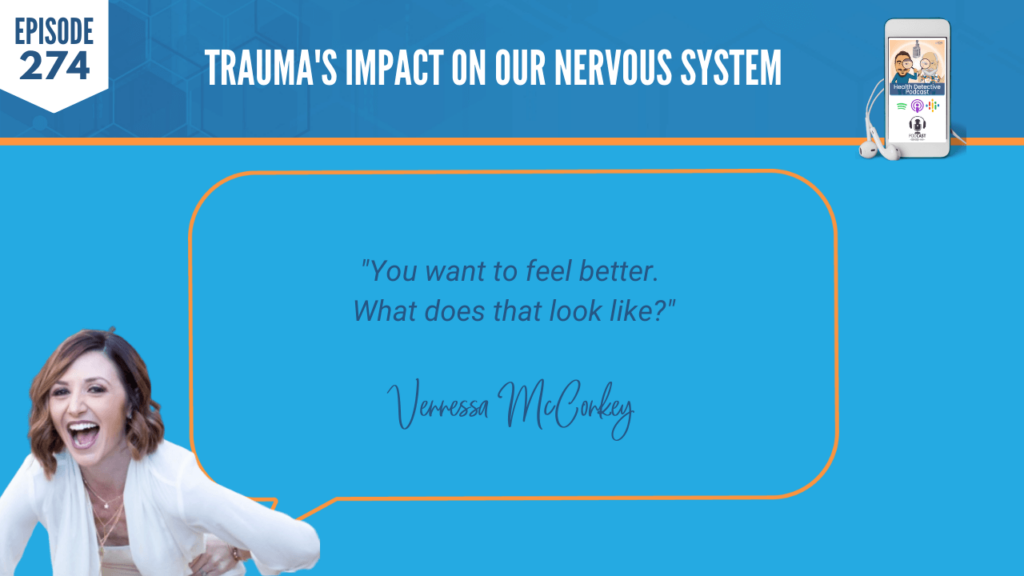
And that’s another thing we have to make sure that we’re addressing with our clients too. You want to feel better. What does that look like? Are you going to now be able to get that job? Maybe you are going to become an FDN yourself now. I’ve got a client who wants to do that now.
Are you going to go out and speak to schools? I bake sourdough, and one of my kid’s teachers, is like, can you come into our class and teach us about sourdough? Okay. Great. Because actually, that’s an insert into the school system to teach them about health and taking care of yourselves and why we’re doing what we’re doing. So, you have to understand why you’re doing what you’re doing.
Trauma’s Impact: Be Yourself
And don’t be everyone else, y’all. Get off of social media. I’m sorry, but stop being everyone else. Tell your story. Write down, here’s my story. How did I feel at this point, at that point, or at the next point? What drove me to this stage here? What drove me to be an FDN? Then just keep sharing that over and over.

Trust me y’all, right on social media, how long do the stories last? 24 hours. Do people scroll for hours and hours to find if you posted that same thing or that same story or in some same manner, how many times you did it? No, they’re not going to. They’re going to see what you’re posting now. You got to get in front of them, but you have to be intentional about it.
[00:50:30] Detective Ev: I love it. The business stuff dropping in. But you’re absolutely right.
I’ll wrap up with this and then I’ll ask where people can find you. This is an interesting one because anyone that’s an adult gets what I’m about to say. People are always going to judge you no matter what. I think every adult would agree with that. What’s tough about being vulnerable, if they’re going to judge me no matter what, why would I not be myself? I think it hurts worse to be judged for what we know is actually us versus what isn’t.
So, I was a butthole in high school when I’m using drugs, doing all these things. I’m not really a butthole at the core. So, if someone calls me that, yeah, it hurts. I don’t appreciate it, but it’s dude, that’s not really me.
Trauma’s Impact: Get Over Yourselves
If someone says, especially at 16, this is like knife-through-the-chest, Hey pizza face, right? That’s now vulnerable for something that actually affects me. If I say that to the girl with beautiful skin, she’d be like, what? You can’t get offended by it because it doesn’t apply.
So, this public speaking coach, it wasn’t really for me personally, but it was in a group I was in. He gave us this long weekend and then the final thing that he ever said there was, how many people are still afraid of public speaking? A few people raised their hands. He went from this really nice guy to very serious for a moment. And he said, get over yourselves.
The reason that this thought about the stories just triggered what he had said back then is we’re not the center of the universe, right? People are not thinking about us constantly. They are 10 times more concerned with their insecurities and how they’re being perceived by others.
Yes, post your story often, but also have that encouragement to be vulnerable. Are there going to be some people that say things? Yes. There has been a very small percentage over my time, especially man, I’m speaking to kids sometimes. Kids don’t lie, generally speaking. There has been some things said where you’re like, how could you even think of that, let alone say that out loud?
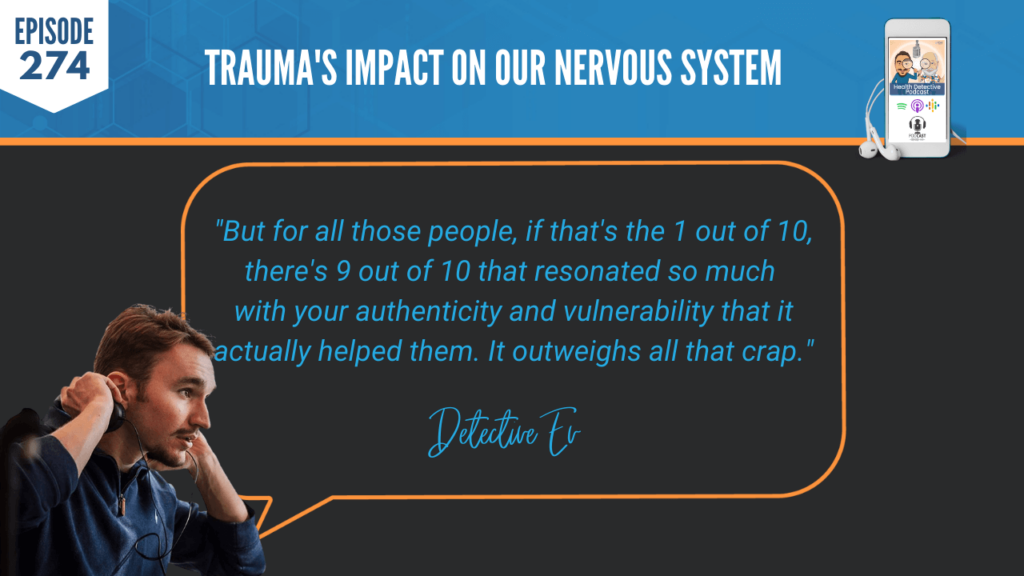
But for all those people, if that’s the 1 out of 10, there’s 9 out of 10 that resonated so much with your authenticity and vulnerability that it actually helped them. It outweighs all that crap. So, don’t let that be the reason you stop.
Where to Find Vennessa McConkey
Now, if someone listened to this one today and maybe they got both podcasts, I hope they listen to both, and were like, she’s speaking my language. I totally know I want someone that can do the labs and the science side. I’m sorry, I keep saying that. Not that this isn’t science, but obviously, we didn’t necessarily rattle off studies today.
There is a ton of science behind what Vennessa is saying, to be clear. But you’re feeling into this. You’re using your intuition in a very intelligent way and mixing it with science. So, if someone wants a practitioner like you, where can they find you?

[00:52:52] Vennessa McConkey: They can definitely find me on Instagram and it’s my name, vennessamcconkey. It is spelled differently so check the show notes there. You can find me at vennessamcconkey.com. Again, my website isn’t all crazy and stuff yet, so I’m big there. And then LinkedIn as well. It’s LinkedIn @Vennessa McConkey. It’s pretty simple there. So yeah, thank you for having me.
[00:53:13] Detective Ev: I know that we’re over on time but I have one more question for you because last time I asked you our signature question – what’s the one thing you’d get everyone to do for their health? This one, especially since it’s so close together, your answer probably wouldn’t have changed. If it was two years, I might would ask the same one again.
Trauma’s Impact: The One Step
But I’ll pose this. If you had one step for people that they somehow have identified and know trauma is definitely a part of my healing journey, I gotta get this under control in some way if I want to get to where I want to go, what’s the first step for someone with that? Is it a counselor, doing something on their own, or reading a certain book? It might be different for everyone, but assuming you could only give one tip to those people, what would you tell them to do?

[00:53:50] Vennessa McConkey: Oh, one tip. My goodness. Definitely find a trauma informed therapist, for sure. I don’t know what I would do without mine. You can do the talk therapy and stuff too.
But also, a huge thing is The Body Keeps Score. I think I mentioned that on my last episode here too. It’s a great book. It’s very intense but it does relate quite a bit.
And then a second book, I know you said one, but a second one too, and it’s an older one, it’s called Emotional Sobriety. That one really dives into why we think the way that we do and why we could be feeling some of the experiences differently than other people, and how to overcome those.
Of course, you can always reach out to me too. I love to be able to share with people and guide them in the right direction based on their experiences because each person is different and unique.
[00:54:41] Detective Ev: Beautiful. Thank you so much for another great episode.
Vennessa McConkey: Oh, you’re welcome.
Conclusion
You can always visit us at functionaldiagnosticnutrition.com, on YouTube @FDNtraining, on Instagram @fdntraining, or on Facebook @FunctionalDiagnosticNutrition.
For more informational and functional health-oriented podcasts like this one, go to functionaldiagnosticnutrition.com/health-detective-podcast/.
To learn more about us, go to functionaldiagnosticnutrition.com/about-fdn-functional-testing/.

